

ESL Writing Exercises: Activities, Worksheets, and Ideas!
We have several free ESL writing lessons on this page, including sample essays, sentence patterns, writing assignments, and more! If you like these lessons, consider buying our ESL writing textbooks to get even more content just like this!
Beginner Writing Lessons
The four units below are all taken from our book Write Right: 9 Beginner ESL Writing Lessons , available for instant download!
Sample Essay: “My Hobby” – Introductory sample essay that students can reference later when writing their own essays
Sentence Pattern: Start/stop verb+ing – Practice adding “ing” to verbs after “start/stop/quit/begin”
Grammar: Past Tense – Simple introduction to past tense verbs
Error Correction Worksheet – Correct the errors in this sample “My Hobby” essay
Assignment: “My Hobby” – Use the grammar and sentence patterns from Unit 1 to write an essay titled “My Hobby”
Sample Essay: “A Funny Story” – Introductory sample essay that students can reference later when writing their own essays
Past Tense Error Correction Worksheet – Review of past tense; rewrite the paragraph and correct the past tense errors
Indention and Quotations – Teaches students to indent new paragraphs and use quotation marks correctly
Indentions and Quotations: Error Correction Worksheet – Identify and correct the mistakes in the paragraph
Writing Assignment: “A Funny Story” – Students use the grammar and sentence patterns from Unit 2 to write an essay titled “A Funny Story”
Sample Essay: “My Favorite Place” – Introductory sample essay that students can reference later when writing their own essays
Sentence Pattern: Although / Even though – Introduction to “although” and “even though”, with sample sentences and practice exercises
Sentence Pattern: not…at all – Introduction to the sentence pattern “(not)…at all”, with sample sentences and practice exercises
Error Correction Worksheet – Identify and correct the mistakes in the paragraph
Writing Assignment: “My Favorite Place” – Students use the grammar and sentence patterns from Unit 3 to write an essay titled “My Favorite Place”

NEW! UNIT 4: “Letter to a Relative”
Sample Essay: “Letter to a Relative” – Introductory sample letter that students can reference later when writing their own essays
Writing Lesson: The Elements of a Letter – Introduction to the elements of a letter (greeting, body, conclusion)
Writing Lesson: Conjunctions – Introduction to the conjunctions and/but/or/so, with an explanation of how to punctuate them correctly
Error Correction: Conjunctions – Identify and correct the mistakes in the letter
Writing Assignment: “Letter to a Relative” – Students use the grammar and sentence patterns from Unit 4 to write an letter to one of their relatives
Intermediate/Advanced Writing Lessons
The writing lessons and worksheets below are taken from our book Write Right: Transitions , available for instant download!
Writing a Formal Paragraph
Topic Sentences (Introduction) – Introduction to topic sentences and their function in a formal paragraph
Introduction to Similes and Metaphors – Using similes and metaphors to write interesting topic sentences
Similes and Metaphors Review – Practice describing people and things using similes and metaphors
Topic Sentences (Review) – Practice writing topic sentences
The Body of a Paragraph (Introduction) – Introduction to the body of a paragraph and the information that should be contained therein
The Body of a Paragraph (Review) – Practice thinking of information to use in the body of a paragraph
Concluding Sentences (Introduction) – Introduction to concluding sentences and their function in a paragraph
Concluding Sentences (Review) – Practice writing concluding sentences
Punctuation and Conjunctions
Sentence Fragments and Complete Sentences – Introduction to sentence fragments and a review exercise to practice identifying them
Run-on Sentences – Worksheet to practice correcting run-on sentences
Comma Splices and Conjunctions – Worksheet to practice using conjunctions correctly to fix comma splices
Commas and Conjunctions (“and”) – Explanation of how to correctly use commas with the conjunction “and”
Semi-colons – Introduction to this often baffling piece of punctuation, with a review exercise
Transitions and Connectors
Listing Things in Order – Practice listing items or events in order using words like “First”, “Next”, “After that”, “Finally”, etc.
In addition / Additionally / Moreover / Furthermore / Plus / …as well – Introduction to these commonly used transitions, with several sample sentences
In addition / Additionally / Moreover / Furthermore / Plus / …as well – Review worksheet to practice writing sentences with these transitions
However / Nevertheless / Still / Despite that / Nonetheless / Even so – Introduction to these commonly used transitions, with several sample sentences
However / Nevertheless / Still / Despite that / Nonetheless / Even so – Review worksheet to practice writing sentences with these transitions
Therefore / Consequently / As a result / Thus / For this Reason – Introduction to these commonly used transitions, with several sample sentences
Therefore / Consequently / As a result / Thus / For this Reason – Review worksheet to practice writing sentences with these transitions
Review of these Transitions and Connectors – Review worksheet to practice using all of the transition words above
More Transitions and Connectors
Although / Even though – Introduction to these commonly used transitions, with several sample sentences and review exercises
Though – Introduction to “though” and it’s various uses in a sentence
Despite / In spite of – Introduction to these commonly used transitions, with sample sentences
Despite / In spite of – Review worksheet to practice writing sentences with these words
Despite vs. Although – Explanation of how to use these similar transition words, with several sample sentences
Despite vs. Although – Review worksheet to practice using “despite” and “although” correctly
Because vs. Because of – Explanation of how to use these similar transition words correctly, with several sample sentences
Because vs. Although – Explanation of the difference between these two words, with several examples and a review exercise
Because of vs. Despite – Worksheet to practice using these transitions, which have nearly opposite meanings
Regardless of – Introduction to this commonly used transition, with several sample sentences
Regardless of / No matter – Review worksheet to practice using these transitions correctly, including an explanation of “embedded questions”.
Review of Transitions and Connectors
Transitions and Punctuation – Explanation of how to correctly punctuate transitions using commas, periods, and semi-colons. Also includes a review worksheet.
Transitions and Punctuation (2) – Students rewrite a short essay, adding punctuation around transition words as needed.
Review of Above Transitions and Connectors – Fill in the blanks with an appropriate transition word to complete the essay
Additional Review of Transitions and Connectors – Review of several transition words/phrases (For this reason / Despite the fact that / No matter / Due to / Consequently / As a result / In spite of / Regardless of / Owing to)
Additional FREE ESL/EFL Writing Worksheets, Activities, and Ideas:
Useful phrases and sentence patterns.
Instead of / Rather than – Handout explaining how to use these phrases, with sample sentences
Instead of / Rather than – Review – Worksheet to practice using “instead of” and “rather than” correctly
Instead – Worksheet reviewing different ways to use the word “instead” in a sentence
Would rather – Handout explaining how to use “would rather”, with sample sentences
Would rather – Review – Worksheet to practice using “would rather” correctly
Prefer – Worksheet to practice using “prefer” correctly
Regardless / Regardless of / No matter – Examples and practice sentences
Gradually / Eventually / Sooner or later / At some point / In the end / …end up… – Examples and practice sentences
More sentence patterns and phrases (in no particular order):
vary / varies from __ to __
that which / those who
Just because [A] doesn’t mean that [B]
If it weren’t for [A], then I never would have [B]
If I hadn’t [A] then I wouldn’t have [B]
I wish I had / I should have
Found myself
(Currently) in the process of
Writing Activities
Putting pen to paper doesn’t always have to be boring. Here are some activities and game-like things to make writing a bit more enjoyable.
Interactive Stories – Students collaborate to write each others’ stories.
The Lying Game – Guess which statements are true and which statements are lies!
Idiom Worksheets – Give advice using idioms. Less a “game” than an “assignment,” though the idioms tend to make things a little more interesting.
Explain the Idiom – Try to guess what the idioms mean, and use them in a dialogue.
Writing Scenarios
- Business English
- Phrasal Verbs
- ESL Library
- Online ESL Curriculum
ESL Activities
ESL Games, Activities, Lesson Plans, Jobs & More
ESL Writing Activities, Games, Worksheets & Lesson Plans
If you’re teaching writing and are looking for some of the best ESL writing activities, along with worksheets, lesson plans and more then you’re in the right place. Keep on reading for everything you need to know about teaching English writing.

ESL writing exercises and games
Let’s check out the top ESOL writing exercises and activities to consider trying out with your students.
ESL Writing Activities and Games for All Ages
Are you ready to get into the ESL writing exercises? Then let’s get to the best English writing ideas. Also, check out some great writing prompts ideas to use in your writing lesson.
#1: 3 Things ESL Writing Activity
I’m ALL about simple and easy for writing activities in emergency situations when you don’t have a lot of time to prep. 3 Things is ideal because it requires nothing except a pen and paper and also requires no prep time.
The way it works is that students think of 3 random things. Then, they give those words to a partner who has to write a short story using them. It can be serious or silly and kind of depends on the words chosen.
Do you want to give it a try with your students? Check out all the details here: 3 Things English Writing Activity .
#2: Journaling for English Learners
When I teach ESL writing classes, I always have students keep a journal. It can either be with pen and paper or online. It’s a fun way for students to work on writing fluency and have some freedom to write about topics they want to write about, not just the ones that I assign.
If you want to see how I set up this ESL writing exercise, check out the following: Journaling for ESL Students . It makes a nice free write activity.
#3: Postcards ESOL Writing Exercise
If you’re looking for a simple, fun ESL writing activity, then you may want to consider having your students write some postcards. Ideally, you could get your hands of a stack of blank, unused postcards. But, if not, students can design their own and then trade with someone else who can fill in the back.
Learn more about this fun writing activity here: ESL Postcard Writing Activity .
#4: A to Z Alphabet Game
Remember that writing is more than a 5-paragraph essay. It’s any time a student is writing something, even one word. With that in mind, you may want to try out this ESL writing game for beginners.
The way it works is that you name a topic. Jobs or animals for example. Then, students have to think of one word for each letter. I give my students a certain amount of time and the team with the most words is the winner.
Do you want to give this writing activity for beginners a try? Check it out here: A-Z ESL Writing Activity .
#5: Conjunctions and Transitions
Words like but, so, and, however, etc. are key in English writing because they join ideas, sentences and paragraphs together. This makes writing easier to understand and helps it to flow better. Even beginners can learn about using things like and or but.
Here are some of the ideas for teaching these words: ESL Conjunction and Transition Activities .

- Amazon Kindle Edition
- Bolen, Jackie (Author)
- English (Publication Language)
- 85 Pages - 02/02/2020 (Publication Date)
#6: Whiteboard Games for ESL Writing Practice
I don’t know why, but students really love to write on the whiteboard. There are a ton of relay type ESL writing activities that you can do. Here are some of the best ones:
ESL Whiteboard Activities .
#7: Dictogloss ESOL Writing Exercise
If you want to challenge your students with some serious listening and writing, then consider this dictogloss ESL activity. The way it works is that you find a passage or write one at an appropriate level for your students.
Then, put the student into pairs and read out the passage at a slightly faster pace than normal. Students have to take notes and then attempt to recreate what they heard by writing. Read the passage again and students add to what they have. Finally, they can compare their version with the original one.
Do you want to give it a try? Read this first: Dictogloss ESL Writing and Listening Activity .
#8: How to Teach English Writing to Beginners
Back when I did the CELTA course, my tutor told me that writing doesn’t have to be a 5 paragraph essay. It can actually be any time the students are writing something in English. With this in mind, here are some of the best activities for absolute beginners to English writing:
Teaching ESL Writing to Beginners .
#9: Fill out an Application Form
One very practical writing activity that we can do with our students is getting them to fill out an application form. If they plan on living in an English speaking country, they’ll certainly have to do this. And, there’s often some very specific vocabulary and expected answers that you can help them with.
More details here: ESL Writing Application Form .
#10: Sentence Structure Activities
Try out these activities to give students some ESL writing practice opportunities.
In speaking, our students can sometimes get away without having great sentence structure. This is because people often speak in sentence fragments and rarely in full sentences.
However, in writing, sentence structure is key and vital to helping our students get their ideas across on paper. Here are some of the best activities to help our students practice this:
ESL Sentence Structure Games and Activities .
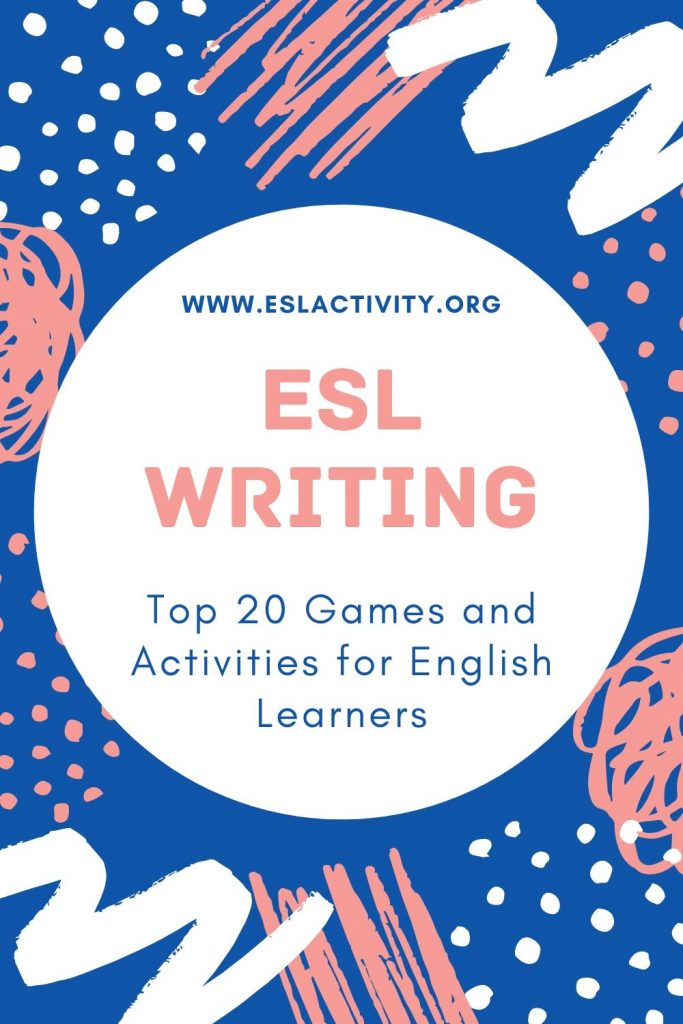
ESL writing games and activities
#11: Is that Sentence Correct?
A simple reading and writing activity is this one that focuses on error correction. The way it works is that you make some sentences, some of which have errors and some that do not. Students have to decide which ones are incorrect and them correct them. It’s ideal for review at the end of class or the beginning of the next one.
Learn more about this writing activity here: ESL Error Correction Activity .
#12: Proof-Reading and Editing
A key part of writing well is proof-reading and editing. Everyone does it, even professional writers! Instead of the students relying on me to correct their errors for them, I like to teach them do to edit their own work. It’s a key skill in the writing process but often overlooked by many English teachers.
Check out this activity for helping students with this writing skill: ESL Proofreading and Editing .

- 146 Pages - 06/18/2020 (Publication Date)
Spending some time working on self-editing skills, instead of relying on the teacher-editing model is a nice way to improve student autonomy in English writing classes.
#13: Focus on Fluency Activity
Many ESL writing textbooks (and teachers too) focus on accuracy in English writing at the expense of fluency. However, both are needed if students are to become proficient in English essay writing. After all, no employer is going to appreciate an employee who can write a simple, but perfect email in half a day! Most would expect it to happen in a few minutes. But, this nice free write activity helps students with writing more quickly.
Check out this ESOL writing exercise to help our students out with this: Fluency ESL Writing Activity .
#14: How to Teach ESL Writing on the Let’s Talk TEFL Podcast
#15: Word Association
I like to use this quick writing activity if I know that students have studied the topic of the day before. For example, jobs and weather are very common in almost all ESL textbooks and if students are at a high-beginner or intermediate level, I guarantee that they already know some of these vocabulary items.
You can find out how to do it right here: ESL Word Association Activity .
#16 : ESL Surveys
I love to use surveys in my classes. They are a super versatile activity that covers all 4 skills, including writing. It’s also easy to make a survey for just about any topic or grammar point. See why I love them so much?
If you want to know more, then you’ll want to check this out: TEFL Surveys.

- Smith, Jennifer Booker (Author)
- 134 Pages - 03/31/2016 (Publication Date)
#17: Opinion Activities and Games
Opinion essays are a classic writing activity for both English learners and students in high school or university. That’s why I like to give my students some chances to practice writing and supporting their opinions in my classes. Do you want to try out some of the best ones? You can find out all the details right here:
ESL Opinion Activities .
#18: Parts of Speech Activities for ESL
English writing is ALL about parts of speech. After all, if you don’t know where the verb, subject, object, adjectives and adverbs go, how can you have any chance of making a coherent English sentence? It’s nearly impossible!
That’s why I like to do some worksheets and practice with my students related to this. If you want to try it out too, here are some of the best ideas:
ESL Parts of Speech Activities .
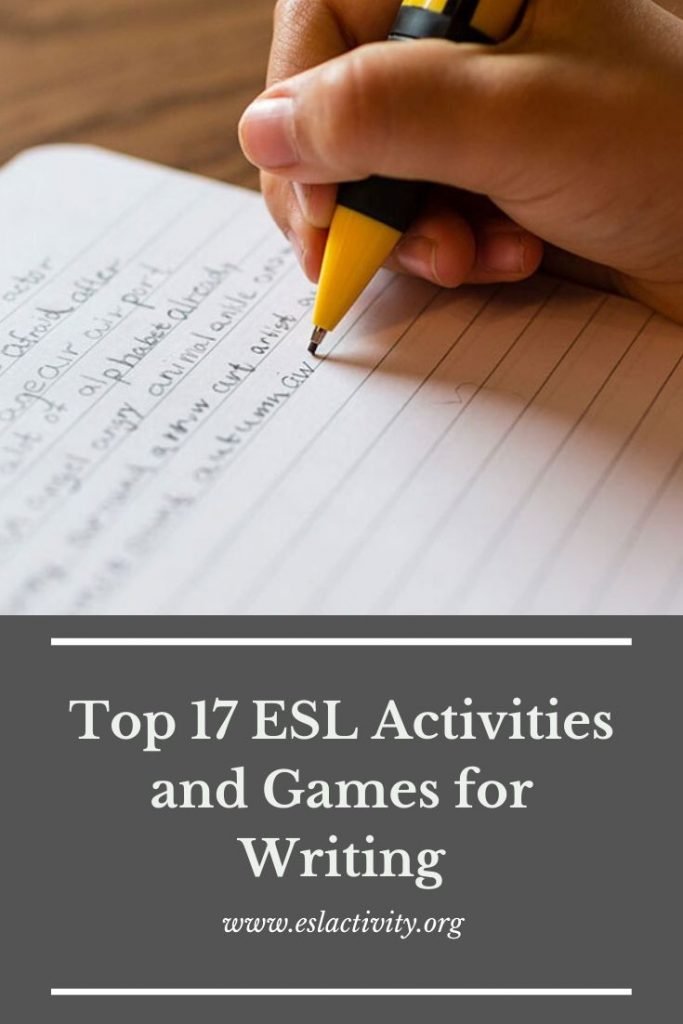
Top 17 ESL writing games and activities
#19: Spelling Challenge Game
Spelling is an important, but often neglected part of writing. In my opinion, it’s worth spending some classroom time on and one way to do that is with this word challenge game. Because it’s done on the whiteboard, it’s ideal for smaller classes.
Want to find out what it’s all about? You can right here: ESL Spelling Challenge Activity.
#20: Dictation
A nice TEFL writing activity that you might want to try out is dictation. It covers not only writing, but also listening, spelling, punctuation, grammar and vocabulary in a big way. Is it obvious why I like it so much?
Try it out with your students today. Learn more here: ESL Dictation Writing Activity .
#21: Write an Interesting Story in English
It can be fun to get students to write their own stories in English. Check out these 6 simple steps to get started:
Writing and Interesting English Story .
#22: TEFL Writing Activities and Games
#23: Brainstorm Games and Activities
One of my favourite, simple ESL writing activities is to get students to brainstorm words or things related to a certain topic or category. It’s a nice way to get some creative juices flowing and can also be used for a quick warmer or review activity.
There are a number of engaging, student-centred activities to consider. Here are some of my favourites: Brain Storming Games.
#24: Freeze Writing Activity
Group writing activities for TEFL classes are few and far between. However, freeze is one of the best ones to consider. Students have to work collaboratively to make stories, line by line is a fun and engaging way.
Want to give it a try? Find out how: Freeze Activity .
#25: Five-Paragraph Essay Writing
For higher-level students, it can be a worthwhile activity to teach students how to write academic essays. Here’s an outline and some tips for how to do that:
Five-Paragraph Essay Template .
#26: More Ideas for TEFL Writing
#27: fill in the blank sentences games.
A nice option for beginners in English writing is to use fill in the blanks. This adds a bit of structure to it and makes it much easier for students! Have a look at some of my favourite options:
Fill In The Blank Sentences Games .
#28: Round Robin Story
Try out this simple story writing activity that can be used for speaking & listening, or writing. Learn more:
Round Robin Story .
#29: Five Senses
Try out this simple activity that involves a lot of adjectives. It can be done with speaking or writing.
#30: Story Starters ESOL Writing Exercise
Provide students with a sentence or a short paragraph to serve as a story starter. Students then continue the story, adding their own ideas and developing the plot. This game encourages creativity, storytelling, and writing fluency. Try out one of my favourite ESOL writing exercises!
#31: Picture Prompts
Show students a captivating image or provide them with a set of pictures. Ask them to choose one or a combination of pictures and write a story, description, or dialogue based on the visuals. Pictures can stimulate imagination and inspire students to write.
#32: Sentence Relay
Divide the class into teams. Give each team a writing prompt or topic. The first student from each team writes a sentence based on the prompt, then passes the paper to the next student, who adds another sentence. The relay continues, and students build a coherent piece of writing. The team with the most creative and well-structured writing wins.
#33: ESL Writing Olympics
Create a series of writing challenges that test different writing skills, such as grammar, vocabulary, sentence structure, or creative writing. Set a time limit for each challenge, and award points to students based on their performance. Students can compete individually or in teams, making it a lively and competitive writing activity.
ESL Writing FAQs
There are a number of common questions that people have about teaching English writing. Here are the answers to some of the most popular ones.
What is ESL Writing?
ESL technically refers to English as a Second Language but the more common usage is anyone who is a non-native speaker of English, whether or not it’s their second, third or fourth language. ESL writing focus specifically on writing skills.
How can ESL Students Improve Writing?
There are a number of ways that ESL students can improve their writing skills:
- Practice, both in class and outside of class is key.
- Give students a reason to write.
- Use peer correction.
- Offer self-editing checklists.
- Give students some freedom to choose what to write about.
- Use a variety of writing activities and games.
- Give students a chance to revise their work based on feedback.
- Strive to make English writing fun and engaging
- Make it relevant to real-life.
- Ensure that your ESL writing classes target the level of the students.
How Can ESL Beginners Learn to Write?
Remember that ESL beginners will not be able to write a 5-paragraph academic essay. Instead, you may want to focus on things like filling in the blanks on a worksheet or writing very simple sentences with a subject, verb, and object.
Why is Writing Difficult for ESL Students?
Writing can be a little bit difficult for ESL students because it not only involves vocabulary and grammar, but things like punctuation, capital letters as well as style and other writing conventions. What does make it easier is that it doesn’t happen in real time like with speaking.
What types of writing assignments are suitable for English learners?
Start with simple assignments like journal writing, personal narratives, and gradually progress to more complex assignments such as essays and reports.
How can I make writing more engaging for English learners?
Make it engaging by using interesting prompts, creative assignments, and real-life scenarios that connect to their experiences and interests.
Should I focus on grammar and vocabulary in writing instruction?
Yes, grammar and vocabulary are essential components of writing. Students should learn to use them correctly to convey their ideas effectively.
What’s the role of peer review in teaching writing to English learners?
Peer review helps students develop critical reading and editing skills, and it allows them to receive feedback from peers before finalizing their work.
How can I help English learners overcome writer’s block?
Encourage them to start with a simple outline, use writing prompts, and create a supportive, low-pressure writing environment in the classroom.
What strategies can I use to assess English learners’ writing effectively?
Use rubrics and clear criteria for assessing content, organization, grammar, and vocabulary. Offer specific feedback to help students understand their strengths and weaknesses.
Did you Like these ESOL Writing Exercises?

- 72 Pages - 12/09/2019 (Publication Date) - Independently published (Publisher)
Yes? Thought so. Then you’re going to love this book you can easily find on Amazon: ESL Writing Activities, Games & Teaching Tips . It’s the first and only ESL activity book dedicated exclusively to teaching writing and it’s a must-have if you’re teaching these kinds of classes.
You can easily get these ESL writing activities in both digital and print formats. Consider keeping a copy on the bookshelf in your office and using it as a handy reference guide. Or, bring the digital version with you on your phone or tablet to your favourite coffee shop for some serious lesson planning for your English writing classes.
It really is that easy to have ESL writing classes! Check out the book on Amazon, but only if you want to get yourself a serious dose of ESL teaching awesome in your life:

Do you Have an ESL Writing Grading Rubric?
If you’re looking for a bit of guidance on how to evaluate your students’ writing, then you’re in the right place. We strongly recommend using a simple rubric that’ll save you a ton of time. Plus, students will understand why they got the grade that they did. All the details can be found here:
ESL Writing Grading Rubric .
ESL Writing Lesson Plans
If you’re looking for some ready-made writing lesson plans that can help your students improve their skills in a big way, you’ll want to check out our top recommendations:
One Stop English
ESL Library
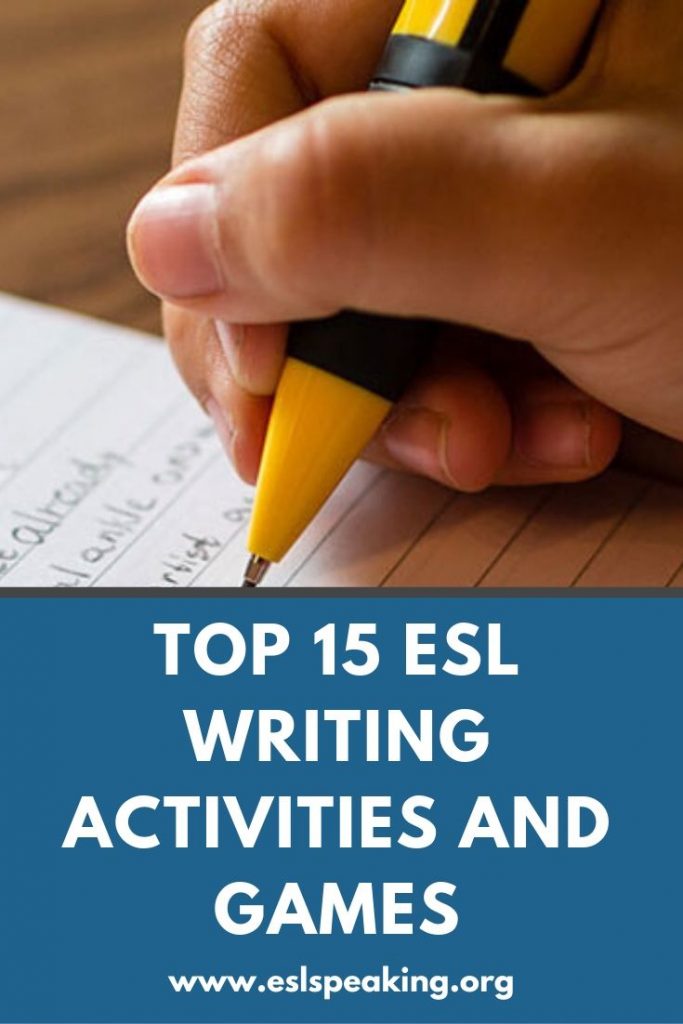
Writing practice for English learners
ESL Writing Worksheets
The good news for English teachers is that there are a ton of English writing worksheets to help you out with just about anything! Why reinvent the wheel if another English teacher has already done the hard work, right? Here are some of the best ESL writing worksheets:
Busy Teacher
ESL Writing Assignments
If you’re not sure about writing assignment options for your ESL/EFL students, here are some of the best ideas that you’ll want to check out:
Tips for Teaching Writing to English Learners
Teaching writing to ESL learners requires a combination of strategies to develop their skills and confidence. Here are some tips to enhance your ESL writing lessons:
Provide Clear Instructions
Begin each writing task by clearly explaining the objectives, requirements, and expectations to the students. Break down the task into smaller steps to make it more manageable.
Model Writing
Show students examples of well-written texts in the target genre or format. Analyze the structure, language features, and organization. Model the thought process and decision-making involved in writing.
Teach the Writing Process
Introduce students to the writing process, which includes prewriting, drafting, revising, editing, and publishing. Emphasize the importance of brainstorming, organizing ideas, and revising for clarity and coherence.
Develop Vocabulary and Language Skills
Help students expand their vocabulary and language skills by providing word banks, relevant phrases, and sentence starters. Teach them how to use transition words and cohesive devices to enhance the flow of their writing.
Focus on Grammar and Sentence Structure in TEFL Writing Games and Activities
Address common grammar errors and sentence structure issues that students may encounter. Incorporate targeted grammar exercises and provide feedback on their writing to improve accuracy.
Encourage Pre-writing Activities
Engage students in pre-writing activities, such as brainstorming, mind mapping, or outlining, to generate ideas and organize their thoughts before starting to write. This helps students structure their writing more effectively.
Provide Writing Prompts
Offer a variety of engaging and relevant writing prompts to spark students’ creativity and interest. Ensure the prompts are aligned with their language proficiency level and encourage critical thinking and personal expression. Here are some ideas:
Peer Feedback and Revision
Incorporate peer feedback sessions where students exchange their writing with classmates for constructive feedback. Encourage students to revise their work based on the suggestions provided, promoting collaboration and revision skills.
Offer Individualized Support
Provide one-on-one guidance and support to students who may require additional assistance. Offer personalized feedback and suggestions for improvement based on their individual writing challenges.
Celebrate Progress
Recognize and celebrate students’ progress in writing. Highlight their strengths and areas of improvement, and provide specific feedback on their achievements. Encourage a growth mindset and foster a positive writing environment.
Encourage Frequent Writing Practice
Assign regular writing assignments to give students ample opportunities to practice their writing skills. Provide a variety of writing tasks, such as descriptive essays, opinion pieces, narratives, or reflective journal entries.
Use Authentic Materials for ESL Writing Activities
Integrate authentic materials like newspaper articles, short stories, or blog posts to expose students to real-life writing and develop their understanding of different writing styles and genres.
Have your say about these ESL Writing Activities and Exercises
What do you think about these writing ESL activities? Did you try out one of them from this or have another that you’d like to recommend? Leave a comment below and let us know what you think. We’d love to hear from you.
Also be sure to give this article a share on Facebook, Pinterest, or Twitter. It’ll help other busy English teachers, like yourself find this useful resource for teaching English writing.
Last update on 2022-07-17 / Affiliate links / Images from Amazon Product Advertising API
About Jackie
Jackie Bolen has been teaching English for more than 15 years to students in South Korea and Canada. She's taught all ages, levels and kinds of TEFL classes. She holds an MA degree, along with the Celta and Delta English teaching certifications.
Jackie is the author of more than 60 books for English teachers and English learners, including Business English Vocabulary Builder and 39 No-Prep/Low-Prep ESL Speaking Activities for Teenagers and Adults . She loves to share her ESL games, activities, teaching tips, and more with other teachers throughout the world.
You can find her on social media at: YouTube Facebook Pinterest TikTok LinkedIn Instagram
Top Selling ESL Activity Book

As an Amazon Associate, I earn from qualifying purchases.
More ESL Activities and Games

Simple Debate Topics: Easy Topics to Debate for All Ages
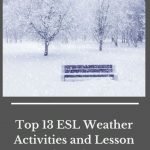
ESL Weather Activities: Make your ESL Weather Lesson Fun!
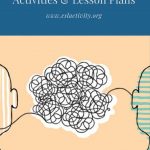
ESL Grammar Activities, Games, Worksheets and Online Practice

ESL St. Patrick’s Day Activities, Games, Lesson Plans & Worksheets
About, contact, privacy policy.
Best-selling author and English teacher Jackie Bolen has been talking ESL activities and games since 2015. The goal is to bring you the best ideas, lesson plans, and activity recommendations for your TEFL classes.
Get in touch: About + Contact
Privacy Policy and Terms of Use
Email: [email protected]
Address: 2436 Kelly Ave, Port Coquitlam, Canada
Free ESL Writing Worksheets For Your Lessons
Struggling to find ESL writing worksheets for your class?
Fret no more! We’ve compiled a list of free worksheets with exercises and practices that’ll turn your students into writing pros in no time — no matter what age or level they are!

Why Should You Spend Time Teaching Writing Skills?
How can you incorporate writing skills into your lessons, free printable esl writing worksheets.
Writing skills are crucial to being a well-rounded speaker of any language. We write every day when we send emails and text messages.
Join our mailing list to receive a free ESL teaching resource every week.
Click to Join
Your students will need good writing skills so that they can write essays and responses to texts as they advance in their English studies.
They’ll also need to be able to write well if they plan on taking the IELTS, the TOEFL, or standardized tests like the ACT or SAT.
Putting words to paper forces students to think about the components of language — how everything fits together and how words are spelled.
There are a number of ways to incorporate writing exercises into your lessons if you don’t already.
You can of course assign reading and writing to your students as homework, but it’s also a good idea to have students do timed writing in class.
This gets students into the habit of just sitting down and writing without procrastinating too much or worrying about whether they’ve said the right thing.
And you’ll love hearing the classroom go silent for 20 minutes or so while everyone’s hard at work.
You can do mini writing assignments throughout each unit, and then devote half or all of a class to a longer assignment (be it an essay, a speech, or a fictional story) at the end.
Use these worksheets for assignments throughout the semester. They’ll help your students develop their voice, learn about rhetoric, and help them better organize their writing.
Download, edit and print all of the following worksheets for ESL teachers – completely free!
Our worksheets archive is currently under development. Please get in touch if you want to contribute resources to share with your fellow teachers.
1 thought on “Free ESL Writing Worksheets For Your Lessons”
Thank you very much!
Leave a Comment Cancel Reply
Your email address will not be published. Required fields are marked *

- Teaching Tips
14 ESL Writing Activities to Spice Up Your Next Class
- October 27, 2020
- No Comments
OUR TOP PARTNER COURSES
120hr + Full Tutor Support
10% off with ESL102021

120hr Online TEFL Course
Best Online Option!

120hr Digital TEFL Course
15% Discount!

120hr Online TEFL Class
Most Reputable!
This post may contain affiliate links (at no extra cost to you). Please read our disclosure for more information.
Writing is one of the four basic English proficiencies next to reading, speaking, and listening. Developing a well-honed ability to write fluidly, naturally, and confidently — while using well-crafted grammatical structure and a wide array of vocabulary — carries several benefits for English learners.
A developed writing ability is essential for scoring well on standardized tests that include essay sections and a well-chosen ESL writing activity can increase the ability to express increasingly complex ideas succinctly and fully, thus improving communication skills across all four proficiencies.
How to Use ESL Writing Activities
As an ESL teacher, part of your teaching scope likely includes improving the writing skills of your students. Fun, engaging activities can be effective tools for achieving the gains in their writing abilities that you hope to see in the classroom.
When to Use ESL Writing Activities
Depending on the type of activity, writing activities can be used:
- At the beginning of a lesson to pique students’ interest and generate excitement about the upcoming lesson.
- Mid-lesson to assess students’ absorption and retention.
- At the conclusion of a lesson to review previously learned vocabulary/grammar.
Setup for ESL Writing Activities
Some ESL writing activities featured here require virtually no setup. Others require a whiteboard and/or projector with computer access. A handful require some preparation before class and pre-printed materials for handout.
Here are a few of the premier ESL writing activities for students divided by age and skill level.
ESL Writing Activities For Young Learners
Flash card writing.
Young learners are often best engaged with visual cues, so ESL flashcards are great tools for the classroom at the primary level.
To conduct the flash card activity, do a warm-up session by going through each card and, together as a class, writing the correct spelling on the board letter by letter.
Then, heat things up by dividing students into teams and having one member of each team write the vocabulary term on the board as quickly as possible when you prompt them with the corresponding flashcard.
The first student to finish earns a point for his or her team. Incentivize the students, if necessary, with a prize for the team with the most points at the end.
What’s Happening?
Building on the theme of combining imagery with writing for younger ESL learners, consider showing students a picture (the more vibrant, colorful, and detailed, the better) and asking them to write what they see. Consider using images with recently learned phrases as a review method.
Write a Letter to Santa (or Spiderman, Harry Potter, or Whomever)
Letter writing is an essential aspect of a young student’s English. Make it fun by having them write to their favorite superhero, celebrity, or best friend.
If your students need extra guidance, prompt them by suggesting what to write about; if writing to Santa, for example, encourage them to discuss what they would like for Christmas.
Help them frame their letter logically by providing a structure guide and helpful suggestions as necessary.
Postcards to Pen Pals
Capture young learners’ imagination by introducing them to a fictitious young boy or girl (or one inspired by real life) who is their same age and who lives in an exotic far-off land.
If your students are interested in a particular region or city, such as San Francisco, adjust your character’s geographic location accordingly.
Have them write a short composition to their new faraway friend that will fit on a postcard about who they are, what they like doing, etc. You can even make your own DIY postcards in the office using colored cardboard or other material.
This is a great opportunity to teach basic introductions and conclusions in English writing, a foundational component of almost any form of writing.
ESL Writing Activities For Adults
Write a business email.
Many adult learners are businesspeople, office workers, or other teachers themselves, so chances are all or most of your students have to send emails at some point in a work-related capacity.
Learning how to use professional, natural-sounding business language is a practical, valuable skill that adult ESL learners will appreciate — in fact, you may find that sounding “native” in both written and spoken word is a major goal of many English students, particularly adults.
Using a projector, create a relatable and entertaining work-related scenario and write an email to a boss or co-worker together about the situation.
Then, have your students craft their own email either in response to the example you provided or in a fresh scenario.
Illustrative Descriptions
Fluent English writers and speakers have the ability to translate visual experiences into the written word, an advanced skill set that can serve your students well in a variety of real-world English-speaking contexts.
Consider using a well-known piece of local imagery with important cultural meaning (such as a portrait of a well-known historical figure or leader) and help your students to write verbal descriptions of the visual cue.
Paraphrasing Activity
Paraphrasing is the ability to quickly recreate sentences with different grammatical structure and vocabulary while retaining the meaning and content of the original sentence.
The ability to paraphrase off the cuff is an important skill that can come in handy for adult learners who interact with other English speakers. Practicing paraphrasing encourages a greater understanding of the nuances of the language and developing alternative ways to construct sentences.
Offer your students a sentence, then ask them to capture the essence of what is communicated and reconstitute the critical elements into a new sentence structure.
Personal Ads for Dating Sites
Due to human nature, social conditioning, or a combination thereof, adult ESL learners’ ears tend to perk up when the topic of conversation moves to the birds and the bees.
If your adult students don’t use personal dating apps like Tinder, chances are they did at some point or their sons and daughters do.
Have your students write a personal ad – either about themselves or about one another in pairs – to be placed on a fictional dating app. Depending on the context of the learning environment, you can spice the activity up by encouraging uncouth language if/when you feel it is appropriate.
ESL Writing Activities for Beginners
Acrostic poem.
This simple writing activity encourages creativity in use of the English terminology as well as recall of vocabulary. To create an acrostic poem activity for your students, write a short series of letters such as BIRD on the board, one on top of the other. Each of the four letters is its own line of poetry like this:
Create an example first for your students, such as:
- Barbara and
- I went to the garden where
- Red flowers grow
- Down by the creek
Then encourage students to think of their own poems to create.
Fill in the Letters
Mastering the letters and their phonetic sounds is a foundational element of ESL writing for beginners.
Present your students with words containing missing letters. You can either use pre-constructed worksheets from other teachers, create your own, or write the words with missing letters on the whiteboard.
After your students complete the words, take the time to sound out the terms again to strengthen students’ phonetic grasp on common English sounds and their corresponding letters. This will build their capacity to conceptualize letters when constructing words and sentences.
Letter/Word Chains
Print a series of words with one giant letter on each page. For example, if the word is HOUSE, then print an H, O, U, S, and E, each on its own respective page.
Scramble the papers up, then call an equal number of students to pages to the front – in this example, five. Say the word they should spell (house) and then watch them scramble to organize themselves in the correct order – helping them when necessary.
Although beginning ESL students don’t put pen to paper in this activity, it is nonetheless a writing activity in that it instills proper spelling and a basic grasp on phonetics that are critical at this stage of language development.
Students also enjoy and may benefit from the social, team-building aspect of this writing activity.
If single words are too easy, you can up the difficulty level by printing entire words on separate pages that form complete sentences.
ESL Writing Activities for Intermediate Students
Western ESL teachers might remember Mad Libs from their youth, a game in which a handful of nouns, verbs, adjectives, and adverbs are extracted from a prewritten story and left up to the participants to fill in.
Mad Libs and its variants like Mad Takes can be wildly entertaining for ESL learners.
Fantasy Dialogue Using Pop Culture
Most of your students, especially in the mid-secondary school age range with a typical skill level for that group, will find this writing activity engaging.
Create a fantasy meeting between two well-known pop culture figures – for example, in Thailand, this would be something like Lady Gaga meeting Harry Potter if selecting from Western celebrities.
You can make the activity more exciting by setting the dialogue against an unusual background – for example, backstage at a concert in Bangkok.
Writing Descriptions of Visual Stimuli
Flash an image of a busy street corner in a major city in your student’s country, or of a well-known piece of historic architecture or famous landform – anything that your students are likely to know well.
Write the question words on the board:
Then ask your students to craft their own descriptions of the images you show for the question words. Some might not fit well – for example, the answer to who? may not appear obvious in an image of an island with no inhabitants. Encourage creative, “out of the box” answers in this regard and reward them with positive feedback.
The Directions Game
Giving and receiving directions is an intermediate English skill that ESL learners who want to travel will need to have. Additionally, this activity is useful to include at the outset of a lesson because the competitive nature captures students’ interest.
Draw a handmade map or grab one off of the internet. Divide the students into two teams. Then, have one student from each team come to the whiteboard with marker in hand.
Ask how to go from point A to point B on the map. Each student, with the help of his or her team, must quickly write coherent directions (turn left, turn right, go east, go west, etc.) from start to finish.
The first team to complete intelligible directions wins.
ESL Writing Activities for Advanced Students
What happens next.
This writing activity has the potential for several modifications to spice it up, but the essential idea is that the class, as a group, creates a story line by line.
The simplest version of Collective Story Time is to begin, as the teacher, with the introductory sentence on the whiteboard or projector: “Billy went to the skatepark.” The next sentence is completed by a student chosen at random, who then passes the baton to another student of his or her choice.
Depending on the age, maturity level, and preferences of students, you might put content limitations in place or interject with your own sentences from time to time to keep the story on a productive track.
Social Media Posts
Nearly everyone uses social media; they identify with it; they engage with it. Instead of fighting students to stay off of their phones in class, why not consider crafting your own Twitter, Facebook, or Instagram posts together as a class?
Use projection technology to supersize the browser or app and brainstorm a Tweet or post about a popular topic or the latest news in your learners’ home country.
Getting to the Point/Cutting Out the Fat
In English writing, more is not always better. The stage at which ESL students begin to develop advanced writing skills and become more confident is the right time to begin to introduce the concept of brevity and its benefits.
Start by offering your own writing sample that is chock full of redundancies, extraneous details, and non-sequiturs. Point some of them out yourself so that they know what to look for. Ask your students to shorten the story by half while keeping the original meaning and the critical details.
Transcription Practice (Dicto-Comp)
For some advanced ESL students who are either working already or will soon join the workforce, the ability to translate spoken English into written form quickly and accurately is an important skill.
Help them develop this skill set by selecting a text that is commensurate with their comprehension level. If you can’t find a suitable sample on the web, consider writing one yourself. The text should be about 500 words.
Students will listen and transcribe what they are hearing as quickly as possible. Emphasize the equal importance of accuracy and speed.
Read a few sentences at a time, pausing when you think appropriate.
Where to Start as an ESL Teacher
Devising effective ESL writing activities — and, equally importantly, adapting them to match the needs, interests, and social context of your students – requires a good bit of trial and error. Inspiration from other teachers’ examples and outside resources can help.To get started developing high-quality writing activities for your students, take a look at our list of free lesson plans . They are full of effective teaching strategies that are backed by years of practical success in ESL classrooms around the globe.
WE* MADE A TEFL!
*Made with love by the same people who run ESL Authority!

- 120hr Online Course with 11 Modules & 85 Lessons
- Full Tutor Support - All Questions Answered in 48hrs
- Fully Accredited and Valid Anywhere
- Perfect for online and classroom teachers
Leave a Reply Cancel reply
Your email address will not be published. Required fields are marked *
THE ONLY TEFL YOU NEED
- 120hr with 11 Modules & 85 Lessons
- Full Tutor Support
- Immediate Digital Certification

FOR TEACHERS
- HIRING GUIDES
- TEFL COURSES
FOR COMPANIES
- SUBMIT A COURSE
- GET IN TOUCH
- PRIVACY POLICY
You are using an outdated browser. Please upgrade your browser or activate Google Chrome Frame to improve your experience.
ESL Essay Writing: 7 Important Tips to Teach Students Plus Resources for Writing Lessons
“Every good story has a beginning, a middle and an end.”
This is true for a good essay, too.
An essay needs a coherent structure to successfully articulate its arguments. Strong preparation and planning is crucial to providing that structure.
Of course, essay writing can be challenging for ESL students. They must order their thoughts and construct their arguments—all in their second language.
So, here are seven ESL essay writing tips that will allow your students to weave together a coherent and persuasive essay, plus teacher resources for writing activities, prompts and lessons!
1. Build the Essay Around a Central Question
2. use the traditional 5-paragraph essay structure, 3. plan the essay carefully before writing, 4. encourage research and rewriting, 5. practice utilizing repetition, 6. aim to write a “full circle” essay, 7. edit the essay to the end, esl essay writing resources.
Download: This blog post is available as a convenient and portable PDF that you can take anywhere. Click here to get a copy. (Download)
Encourage your students to build all their writing around one central question.
That central question is the engine of the writing—it should drive everything!
If a word or sentence is not assisting that forward motion toward the explication of that question and its possible answers, then it needs to be reworded, rephrased or just plain cut out and discarded.
Lean writing is merciless. Focusing on a central question throughout the prewriting, writing and rewriting stages helps develop the critical faculties required to discern what to keep and what to throw away.
Providing a clear structure for the student to approach essay writing can do a lot to build their confidence. The 5-paragraph essay, or “hamburger” essay, provides that clear structure for ESL writers.
Generally, this structure employs five separate paragraphs for the entire essay. Each paragraph serves a specific purpose, melding together to form a coherent whole:
- Paragraph 1: The introductory paragraph. This includes the thesis statement, orientating the reader to the purpose of the essay.
- Paragraphs 2 to 4: The body paragraphs. These make individual points that are further backed up by various forms of evidence.
- Paragraph 5: The conclusion paragraph. This provides a summation of the arguments and a final statement of the thesis.
While students do not need to rigidly follow this format forever, the simple structure outlined above can serve as excellent training wheels for your writers.
Using the 5-paragraph structure as outlined above makes planning clear cut.
Once they have their theses and are planning their paragraphs, share with the students the ridiculously useful acronym P.E.E. This stands for Point, Explanation and Evidence.
Each body paragraph should make a point or argument in favor of the central thesis, followed by an explanation of this point and relevant evidence to back it up.
Students can make note of all their points, explanations and evidence before they start writing them in essay form. This helps take away some of the pressure ESL writers feel when faced with a blank page.
Extol the necessity for students to constantly refer to their planning. The mind-mapping techniques popularized by Tony Buzan can be useful at the planning stage and make for easy reference points to ensure focus is maintained throughout the essay.
Having a visual reference such as this can help ensure that your student-writers see each piece of the whole as well as that elusive “bigger picture,” so it becomes a case of seeing the forest and the trees!
Just as planning is crucial, so too is research.
Often ideas or connections do not occur until the writing process has begun. This is a good thing! Essay writing is a creative act, so students can have more ideas along the way and work them in as they go.
The key is to always be able to back up these ideas. Students who have done their research on their subject will be much more confident and articulate in expressing their arguments in their writing.
One way you can help students with context and research is to show relevant video content via FluentU . This language learning program uses authentic videos made by and for native speakers to help students learn English.
You can watch videos as a class or assign them directly to students for individual viewing. Videos come equipped with interactive bilingual subtitles and other learning tools such as multimedia flashcards and personalized quizzes so you can see how each student is doing.
No matter how your students do their research, the important thing is that they explore and understand their topic area before beginning the big task of writing their essay.
Even with thorough planning and research, writing oneself into a linguistic cul-de-sac is a common error. Especially with higher-level students, unforeseen currents can pull the student-writer off course.
Sometimes abandoning such a sentence helps. Going back to the drawing board and rewriting it is often best.
Students can be creative with their sentence structures when expressing simpler ideas and arguments. However, when it comes to more complex concepts, help them learn to use shorter sentences to break their arguments into smaller, more digestible chunks.
Essay writing falls firmly in the camp of non-fiction. However, that doesn’t mean that essay writers can’t use some of the techniques more traditionally associated with fiction, poetry and drama .
One technique that’s particularly useful in essay writing is repetition. Just as poetry relies heavily on rhythm, so too does argument. Repetition can provide that sense of rhythm.
This is because written language has its origins in oral language. Think of the great orators and demagogues and their use of repetition. Speechwriters, too, are well aware of the power of repetition.
The writing principle of the “rule of 3” states that ideas expressed in these terms are more convincing and memorable. This is true of both spoken and written words and the ideas they express. Teach your students to use this method in their essay writing.
The very structure of the 5-paragraph essay lends itself to planning for this repetition, in fact. Each idea that is explored in a body paragraph should be outlined first in the introductory paragraph.
Then, the single body paragraph devoted to the idea will explore it at greater length, supported by evidence. And the third rap of the hammer occurs in the summation of the concluding paragraph, driving the point securely and convincingly home.
As mentioned at the start of this post, every good essay has a beginning, a middle and an end.
Each point made, explained and supported by evidence is a step toward what the writing teacher Roy Peter Clark calls “closing the circle of meaning.”
In planning for the conclusion of the essay, the students should take the opportunity to reaffirm their position. By referring to the points outlined in the introduction and driving them home one last time, the student-writer is bringing the essay to a satisfying full circle.
This may be accomplished by employing various strategies: an apt quotation, referring to future consequences or attempting to inspire and mobilize the reader.
Ending with a succinct quotation has the double benefit of lending some authoritative weight to the argument while also allowing the student to select a well-written, distilled expression of their central thesis. This can make for a strong ending, particularly for ESL students.
Often the essay thesis will suggest its own ending. If the essay is structured around a problem, it’s frequently appropriate to end the essay by offering solutions to the problem and outlining potential consequences if those solutions are not followed.
In the more polemical type of essay, the student may end with a call to arms, a plea for action on the part of the reader.
The strategy chosen by the student will depend largely on what fits the central thesis of their essay best.
For the ESL student, the final edit is especially important.
It offers a final chance to check form and meaning. For all writers, this process can be daunting, but more so for language students.
Often, ESL students will use the same words over and over again due to a limited vocabulary. Encourage your students to employ a thesaurus in the final draft before submission. This will freshen up their work, making it more readable, and will also increase their active vocabulary in the long run!
Another useful strategy at this stage is to encourage students to read their work aloud before handing it in.
This can be good pronunciation practice , but it also provides an opportunity to listen for grammatical errors. Further, it helps students hear where punctuation is required in the text, helping the overall rhythm and readability of the writing.
To really help your students become master essay writers, you’ll want to provide them with plenty of opportunities to test and flex their skills.
Writing prompts and exercises are a good place to start:
Descriptive writing activities encourage students to get creative and use their five senses, literary devices and diverse vocabulary. Read on for eight descriptive writing…
https://www.fluentu.com/blog/educator-english/esl-writing-projects/ https://www.fluentu.com/blog/educator-english/esl-picture-description/
Giving good ESL writing prompts is important because inspiring prompts inspire students to write more and writing more is how they improve. Read this post to learn 50…
You’ll likely also want to teach them more about the mechanics of writing :
Are you looking for ESL writing skills to share with your ESL students? In this guide, you’ll find different ESL writing techniques, such as helping students understand…
Would you like to introduce journal writing into your ESL classes? Fantastic idea! Here are 9 essential tips to make it creative, engaging and fun.
https://www.fluentu.com/blog/educator-english/esl-writing-lessons/
Essays are a great way not only for students to learn how the language works, but also to learn about themselves.
Formulating thoughts and arguments about various subjects is good exercise for not only the students’ linguistic faculties, but also for understanding who they are and how they see the world.
Enter your e-mail address to get your free PDF!
We hate SPAM and promise to keep your email address safe

12 Essential Paragraph and Essay Writing Skills Exercises and Worksheets
Elementary paragraph and essay writing skills include brainstorming and outlining, as well as the ability to write attention getters, topic and support sentences.
1 Elementary academic paragraph writing lesson
This is a bare bones elementary paragraph writing lesson for English language learners that aims to help them understand paragraph types and the components of a paragraph. It is particularly aimed at students who have vocabulary skills but almost no writing skills.

Elementary paragraph writing lesson (PDF)
2 Brainstorm worksheet cluster diagram
This is a brainstorming and academic essay planning worksheet for students writing essays. The best way to get ideas for a paragraph or essay is to brainstorm with the aid of a graphic organizer. Students can freely associate ideas to a topic. This allows them to be more creative and explore any path their minds might take.
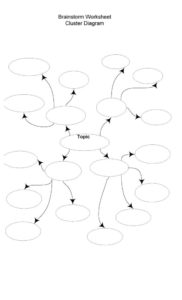
Brainstorming worksheet cluster diagram (PDF)
Subscribe to Eslflow
Subscribe to get full access to the latest and best resources from eslflow.com . There are no ads in the newsletter and you will receive entertaining, high quality, and up-to-date teaching resources regularly. And, if you subscribe, you will be supporting the eslflow website.

3 Outlining a basic paragraph
This is a paragraph outline worksheet to help students learn how to write a basic paragraph.
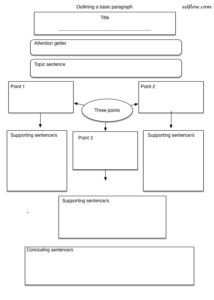
Paragraph outline worksheet (PDF)
4 Outlining an essay
This is an essay outline worksheet to help students focus on organization and planning when preparing to write essays.
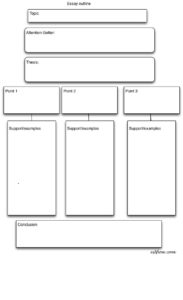
Essay outline worksheet (PDF)
Related Resources:
6 exercises for writing topic sentences
10 opinion and argument writing worksheets
8 comparison/contrast templates and exercises
10 cause/effect writing activities
3 kinds of exercises for teaching transitions
6 memorable narrative essay writing practice exercises (PDF)
6 delightful descriptive paragraph and essay writing exercises (PDF)
5 Writing main idea sentences for essays or paragraphs (with possible answers)
In this worksheet students practice writing main idea sentences by looking at the pictures, and writing an appropriate main idea sentence. They should try to express themselves freely.
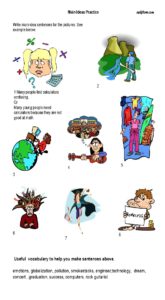
Main idea writing practice worksheet (PDF)
6 Attention getters (with pictures) for essays
Attention getters are essential at the beginning of a paragraph or an essay when you want to attract the reader’s attention. There are many kinds of attention getters but a few of the most common are anecdotes, quotation, provocative questions and surprising facts or statistics. Students can practice attention getters by looking at the pictures and trying to write an attention getter for each one.
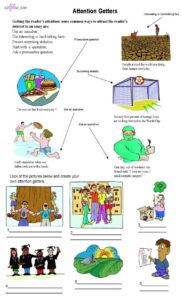
Writing attention getters (PDF)
7 Attention getters comprehension exercise
This worksheet is a good way to challenge students’ knowledge of different types of attention getters.
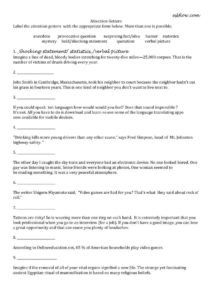
8 Kinds of attention getters writing exercise
This is another worksheet that tries to impress upon students the importance of good openings or attention getters.
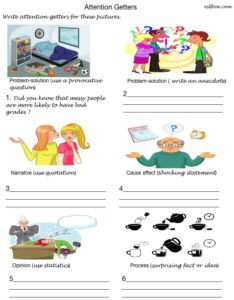
9 Understanding support sentences
This support sentence writing worksheet can be used to test students’ understanding of both topic and support sentences.
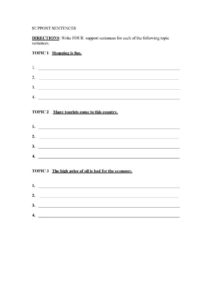
Writing support sentences (PDF)

12 Replies to “Basic Writing Templates, Exercises and Worksheets”
Great material. thanks.
Amazing!!! The exercises are completely helpful to me!!!! Thank a lot!
Amazing , i appreciate. exercises are unbelievably useful. especially that they are free of charge.
Thanks for the comments. Glad the exercises are useful.
Thank you! very useful material
This is a wonderful site. I was wondering if there was an answer sheet for the 6 Understanding Topic Sentences? Thank you for offering this information about writing paragraphs.
So helpful… many thanks.
Thank you so much. You are indeed a great help to many. Blessings
Good creative material
The materials are good and easy to use by my students. With the help of the pictures and graphic, my student can easily understand on how to write and essay. thank you for the creative ,materials,
Some really good material BUT the ADS are so annoying!
This is really useful information and activities for busy teachers. The beauty of it is you can use it at all levels, particularly if your classroom profile is spiky. Keep up the good work.
Leave a Reply Cancel reply
Your email address will not be published. Required fields are marked *
Save my name, email, and website in this browser for the next time I comment.
This site uses Akismet to reduce spam. Learn how your comment data is processed .
RECENT ESL EXERCISES
- Essential listening exercises for ESL classes
- Daily routines and schedules
- Sentence starters
- Writing topic sentences
- Shopping online listening, speaking and vocabulary
- Import/export, logistics and supply chain exercises
- Create a conversation
- Using comparative adjectives
- Gerunds and Infinitives Grammar, Speaking and Listening Activities
EnglishForEveryone.org
Writing practice worksheets terms of use, finish the story writing worksheets.
- Beginning Finish the Story - The Snow Day
- Beginning Finish the Story - The Fair
- Beginning Finish the Story - Summer Camp
- Beginning Finish the Story - The Birthday Party
- Beginning Finish the Story - The Halloween Costume
- Beginning Finish the Story - The 4th of July
- Intermediate Finish the Story - The Beach Trip
- Intermediate Finish the Story - The Great Find
- Intermediate Finish the Story - Which Way?
- Intermediate Finish the Story - Finding Muffin
- Intermediate Finish the Story - The Zoo
- Advanced Finish the Story - The Troublemaker
Question Response Writing Worksheets
- Beginning Question Response - Your Favorite Color
- Beginning Question Response - Your Favorite Day
- Beginning Question Response - Your Favorite Number
- Beginning Question Response - In Your Family
- Beginning Question Response - Your Favorite Sport
- Beginning Question Response - Your Favorite Clothes
- Beginning Question Response - Your Favorite Music
- Beginning Question Response - How You Relax
- Beginning Question Response - Lunch Time
- Beginning Question Response - With Your Friends
- Beginning Question Response - Collecting Stamps
- Beginning Question Response - Your Birthplace
- Beginning Question Response - Starting Your Day
- Intermediate Question Response - Your Favorite Food
- Intermediate Question Response - Your Favorite Movie
- Intermediate Question Response - Your Favorite Song
- Intermediate Question Response - TV Programs
- Intermediate Question Response - Your Favorite Time
- Intermediate Question Response - Which Country?
- Intermediate Question Response - The Wisest Person
- Intermediate Question Response - Someone You Admire
- Advanced Question Response - A Great Accomplishment
- Advanced Question Response - The Most Exciting Thing
- Advanced Question Response - Oldest Memory
- Advanced Question Response - The Most Productive Day of the Week
- Advanced Question Response - An Interesting Person
- Advanced Question Response - What Have You Built?
- Advanced Question Response - What You Like to Read
Practical Writing Worksheets
- Beginning Practical - Grocery List
- Beginning Practical - TO Do List
- Beginning Practical - At the Beach
- Beginning Practical - The Newspaper
- Intermediate Practical - Absent From Work
- Intermediate Practical - Your Invitation
- Intermediate Practical - Paycheck
- Intermediate Practical - The New House
- Advanced Practical - Soccer Game Meeting
- Advanced Practical - Note About Dinner
- Advanced Practical - A Problem
- Advanced Practical - A Letter to Your Landlord
- Advanced Practical - A Product
Argumentative Writing Worksheets
- Intermediate Argumentative - Cat, Star, or Book?
- Intermediate Argumentative - Soccer or Basketball?
- Intermediate Argumentative - Giving and Receiving
- Intermediate Argumentative - Does Practice Make Perfect?
- Advanced Argumentative - Five Dollars or a Lottery Ticket?
- Advanced Argumentative - The Most Important Word
- Advanced Argumentative - An Apple
- Advanced Argumentative - Too Many Cooks
Writing Worksheets
- Beginning Writing Worksheet
- Intermediate Writing Worksheet
- Advanced Writing Worksheet
Using Precise Language
- Using Precise Language - An Introduction
- Using Precise Language Practice Quiz
Home | About | Privacy Policy | Terms of Use | Contact Us

- Learning Resources
- For Teachers
40 ESL Essay Writing Topics + Prompts
By VIPKid | April 20, 2018
Ready to start teaching English online?
Writing ESL essay writing is hard for most students and many will struggle at first before learning to write well.
However, writing skills are a crucial part of learning a new language .
In this piece, we’ll share some ESL writing prompts and ESL essay topics for five different kinds of essays. They should help your students develop their grammar and vocabulary skills while teaching them how to write coherently.
(While they work for all kinds of students, we’ve found these topics are especially handy for teaching English to kids .)
Writing practice should never be boring! When you’re done this article, check out the 10 most engaging writing activities here .
Descriptive ESL Writing Topics
- Describe your favorite place in as much detail as possible.
- Describe your favorite fictional character in as much detail as possible.
- Describe a famous person – e.g. a singer or athlete – that you admire. Focus on both their appearance and personality traits.
- Describe a family member or your best friend as detailed as possible. Discuss how they look and their personality.
- Choose a hobby or favorite activity and describe why and how you do it.
- Describe your most memorable holiday or vacation spot in as much detail as possible.
- Describe a photo or work of art in as much detail as possible.
- Pick your favorite food . Describe what you taste, smell, and sense while eating or drinking it.
Earn up to $22 an Hour Teaching English from Home
Explanatory ESL Essay Topics

- Give directions for getting from one point to another . For example, how to get from your home to your school. Describe the landmarks someone might see along the way.
- Explain how to cook your favorite meal . Provide a recipe and the step-by-step instructions.
- Explain your favorite computer game . What should a player do to win? What are some playing tips?
- Explain what you would do if your friends show up at your house unexpectedly . Say how you would entertain them.
- Explain how to make a bed . This task is seemingly simple but allows you to write about everyday habits you might never think through in detail.
- Explain how to make a paper airplane . Again, this task has many precise, technical details that that should be included in the essay.
- Explain how to brush your teeth . Try to make your essay about a seemingly mundane task more interesting.
- Explain how to pack a suitcase when going on a holiday. List out all the objects and pieces of clothing you would bring.
ESL Essays Topics to Practice Verb Tenses

- Talk about a time in the past when you had to make a difficult decision . Explain what you did and why.
- Describe your dream place to live . Why would you want to live there? What would you do?
- Write about three specific goals you want to achieve this year. Explain how you are going to achieve them.
- Write about something you regret having done . Point out what could have happened if you had not made that decision.
- Describe the world 100 years from now . Describe how people live, and new inventions and also the things that will not change.
- Talk about your earliest memory . What happened? How well do you remember the events?
- Write a short essay about how you prepared for class . Now “translate” that essay into future tense. In other words, the essay should say how you plan to prepare for class.
Argumentative ESL Essay Topics

- Are smartphones good or bad? Give some arguments to support your position.
- What are the advantages and disadvantages of public schools and private schools ?
- What is your favorite book or movie ? Convince others, through your essay, to read or watch it.
- Is it the case that the more people that have cars, the better? What are some advantages and disadvantages of public transit ?
- Should money be spent on space exploration ? Give arguments to support your opinion.
- You’re the mayor of your town or city. Explain in an essay your recent decision to ban smoking . Then, from another person’s perspective, write a letter to the mayor protesting this new law.
- Reading books vs. watching movies . Which do you prefer and why?
- What are the pros and cons of e-readers compared to paper books?
Hypothetical ESL Essay Topics
- What would you do if you were late for an important class?
- What would you do if your car got a flat tire on the highway?
- If you had the power to change one thing about your past, what would it be?
- If you had the power to alter one major historical event , what would it be?
- If you could take any superhero’s powers , who would be your choice?
- How would you feel if, one day, you woke up 300 years in the past ?
- What would you do if you won the lottery ? Would your life change day-to-day?

Some General ESL Essay Tips
When checking ESL essays, pay attention to the following key points:
- Grammar. The ESL essay should be grammatically correct.
- Vocabulary. The more new vocabulary the essay contains, the more points it will get.
- Text flow. The text of the essay should flow logically and naturally. Pay attention to the use of connecting words and phrases. These include first of all , secondly , moreover , in addition , besides , finally , on the one hand, on the other hand , and as a result .
- Sticking to the topic. Some essay writers tend to deviate from ESL essay topics. However, a perfect ESL essay should stay as close to the point as possible.
A good essay typically has the following parts:
- An introduction . Here, the author gives some general information about the topic or lays out their argument. An effective intro entices readers to read further.
- The body . In an argumentative essay, the body could be 2 to 3 paragraphs. Each should introduce their arguments and support them with examples. In other types of essays, the content may vary. For example, the body may include descriptions, explanations, or personal stories.
- Conclusion . The author should logically conclude or summarize their thoughts and arguments.
How Do You Teach Writing?
It doesn’t matter if you teach English online or if you’re a classroom teacher, we want to know about your teaching styles. Do you use writing prompts, games and activities, or something else entirely?
Earn $15-22 an hour Teaching English from Home
Share This Story
Related Articles

Tips to Help Increase Your VIPKid Class Bookings
If you're looking to increase your class bookings with VIPKid, look no further! We have 6 tips to help get you more classes.
June 10, 2021

How to Prepare for Your VIPKid Interview: 18 Dos and Don’ts
Finally, a play-by-play on How to Prepare for Your VIPKid Interview. We’ve broken down 18 Dos and Don’ts for the hiring process, what to expect, and how to Wow the interviewers!
May 13, 2021
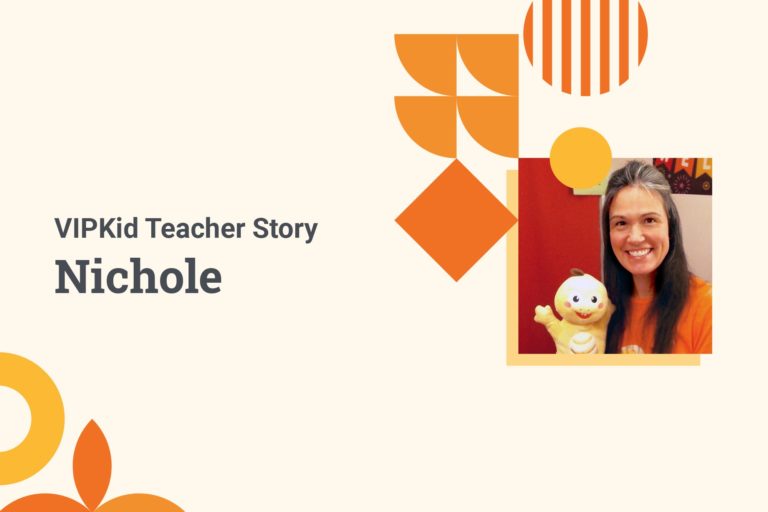
How to Improve Reading Comprehension When Teaching English
VIPKid Teacher Nichole, a reading specialist with more than 20 years of teaching experience discusses her tips Improve Reading Comprehension.
May 4, 2021
By continuing to use this site, you accept our use of cookies . You can change your cookie settings at any time.

Are you a learner at C1 English level (advanced) ? This section offers writing practice to help you write clear, well-structured texts about complex subjects. Texts include essays, proposals, articles, reports, reviews and emails.
Each lesson has a preparation task, a model text with writing tips and three tasks to check your understanding and to practise a variety of writing skills. Make a start today.
Choose a writing lesson

A music review
Learn how to write an album review.
- Read more about A music review
- Log in or register to post comments

A proposal for a digital newspaper
Learn how to write a proposal.
- Read more about A proposal for a digital newspaper

A report on a research study
Learn how to write a report on a research study for your company.
- Read more about A report on a research study

A response to a complaint
Learn how to write a response to a complaint.
- Read more about A response to a complaint

An email explaining an incident
Learn how to write an email to explain an incident to your manager.
- Read more about An email explaining an incident

An email request
Learn how to write a formal email to make a request.
- Read more about An email request

An email to a friend
Learn how to write an email to a friend.
- Read more about An email to a friend

An essay about women in science
Learn how to write an essay that suggests reasons for and solutions to a problem.
- Read more about An essay about women in science

An opinion essay
Learn how to write an opinion essay.
- Read more about An opinion essay

Conference bios
Learn how to write a short biography for a conference programme.
- Read more about Conference bios

Describing a table
Learn how to summarise information in a table and write a report on the main features.
- Read more about Describing a table

The changing workplace
Learn how to write about changes in the business workplace.
- Read more about The changing workplace
Learn to write in English with confidence
Our online English classes feature lots of useful writing materials and activities to help you develop your writing skills with confidence in a safe and inclusive learning environment.
Practise writing with your classmates in live group classes, get writing support from a personal tutor in one-to-one lessons or practise writing by yourself at your own pace with a self-study course.
Explore courses
Online courses

Group and one-to-one classes with expert teachers.

Learn English in your own time, at your own pace.

One-to-one sessions focused on a personal plan.

Get the score you need with private and group classes.
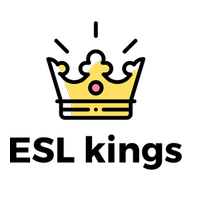
Exercise 6: Writing an essay for examination from 2024 (Ultimate Guide)
Exercise 6 of the Reading and Writing paper of the IGCSE English as a Second Language (ESL) exam (0510/0511/0991/0993) is always a formal or semi-formal writing. It can be an article, an essay, a report, or a review.
In this article, you will discover how to write an almost-perfect essay that impresses the examiner and gets you the highest band. So, are you ready? Let’s dive in!
So, what is an essay?
An essay is a short piece of writing on a particular subject. The purpose of an essay is to present an argument or point of view about a particular topic and give examples or reasons to support it. The topic will be a question or an issue which people generally have different opinions about.
The essay could present both sides of the argument, or just one, depending on the instructions given in the task. So, if the instructions ask you to give your opinion, you can address just this one point of view, or you can discuss the arguments for and against. But if the task instructions state that arguments for and against should be included, then you should address both points of view.
The Tone and Register of an Essay
In the exam, the essay is usually for your teacher, so the tone and register should be formal or semi-formal . Therefore, it should avoid language that is too idiomatic and colloquial.
Now, before diving into the details of how to write a successful essay, let’s first explore a few differences between articles and essays.
Differences between an article and an essay
An essay is very similar to an article with only a few key differences.
An article is usually published in a newspaper or a magazine, so as far as the exam is concerned, the audience is often students at your school (school magazine article), or sometimes your teacher or the local newspaper.
The audience of an essay is often your teacher (who requested the essay in the first place).
An article is generally written to inform and persuade the reader that a certain viewpoint is correct.
An essay is generally written as a response to a question or a proposition (often by your teacher). It presents an argument or point of view about a particular topic and gives examples or reasons to support it.
Tone and style:
Articles generally have a more objective tone and style, focusing on presenting information in a neutral or balanced manner.
Essays are generally subjective, reflecting the writer’s opinion and perspective.
An article may have a heading to grab the reader’s attention (though not compulsory in the exam).
An essay does not require a heading.
The format of a one-sided argument essay
A one-sided argument essay can have two formats, depending on whether you include a counterargument from the opposing viewpoint or not.
Paragraph 1: Introduction (including your opinion)
Paragraph 2: First point supporting your opinion with an explanation
Paragraph 3: Second point supporting your opinion with an explanation
Paragraph 4: State a counterargument (an idea from the opposing viewpoint) and counter the counterargument (i.e., explain why this counterargument is invalid). In other words, state a point made by people who have a different opinion from yours and explain why they are wrong.
Paragraph 5: Conclusion (including your opinion again but in different words)
Paragraph 2: One or two points supporting your opinion with an explanation
Paragraph 3: One or two points (different from those of the previous paragraph) supporting your opinion with an explanation
Paragraph 4: Conclusion (including your opinion again but in different words)
The format of a two-sided argument essay
Paragraph 1: Introduction (without your opinion)
Paragraph 2: One side of the argument
Paragraph 3: The other side of the argument
Paragraph 4: Conclusion (including your opinion)
Introduction
The purpose of the introduction is to inform the reader about the main point (topic) of the essay and engage the reader to make them interested in the topic. The main components of an effective introduction are:
- Topic sentence
Start your essay with a brief topic sentence that outlines the argument that the essay will discuss. Give forceful statements rather than “I think that”, “maybe” or “perhaps”. For example, “Teenagers love fast food.”, “Nowadays, music plays an indispensable role in our lives.”, etc.
To write an effective topic sentence, you might use adverbial time phrases and generalizations . Here are some examples of each.
Adverbial time phrases
- Nowadays/these days/currently
- Every day/week/year
- Recently/for many years/decades
- In the past
- 10 years ago
- In the last (few/five) (days/weeks/months/years/decades)
Generalization
- A large number of / The vast majority (of)
- Several/some
- Not many/hardly any/ few
- In almost all cases
- In the majority of cases
- In a large number of cases
- In most cases
- In some cases
- On the whole/ Overall
- Rhetorical question(s)
Use rhetorical questions (questions that don’t require an answer but make your reader think) to get the reader interested in the topic and encourage them to read on. For example:
- How much longer do animals have to suffer?
- Could you live with yourself if you missed out on this opportunity?
- How could we possibly stand the …?
- What would happen if …?
- Could your conscience cope with …?
- Is it really worth …?
- Do you want to be part of …?
- Should students do sport at school?
- Should teenagers completely avoid fast food?
- We all love convenience food. But is it the best thing for our waistlines, our wallets and our world?
- Your opinion (if it is a one-sided argument essay)
If you are writing a two-sided argument essay, DO NOT give your opinion in the introduction.
If you are writing a one-sided argument essay, you MUST give your opinion (whether you support or oppose the viewpoint expressed in the statement).
Here are some opinion phrases to help you express your opinion.
- In my opinion/view
- From my perspective
- From my point of view
- I concur/agree
- I believe/think (that)
- It seems to me that
- I am in favour of
- I am against the idea of
- I am strongly opposed to
- I disagree/cannot accept
You may also kill two birds with one stone and begin your essay with a rhetorical question that introduces the topic to the reader, thus acting as a topic sentence. Here are some examples.
“Have you ever thought how school life would be if the school day started later? In my perspective, this will have countless benefits.”
“Should students do sport at school? This is a question which people have different opinions about.”
One-sided essay structure:
Body paragraph 1: First idea supporting your opinion with an explanation
Body paragraph 2: Second idea supporting your opinion with an explanation ( should be different from the first idea )
Body paragraph 3: State a counterargument (an idea from the opposing viewpoint) AND counter the counterargument (i.e., explain why this counterargument is invalid). In other words, state a point made by people who have a different opinion from yours and explain why they are wrong.
Body Paragraph 1: one or two points supporting your opinion with an explanation
Body Paragraph 2: one or two points (different from those of the previous paragraph) supporting your opinion with an explanation
When introducing the counterargument in the 3 rd body paragraph, use any of the following phrases.
- Opponents of this idea claim/assert/argue that …
- Those who disagree/are against these ideas may say/insist that …
- Some people allege/argue/contend that …
- Some people may suggest/point out that …
- A common counterargument is that …
- It can be argued that …
When countering the counterargument in the 3 rd body paragraph, use any of the following phrases depending on the context.
- Although true to a certain extent, …
- While this may be true to some extent, …
- While it is true that …, it is important to consider…
- While some may believe that … recent studies have shown that …
- What this invalid argument misses is …
- What these people fail to notice/take note of is …
- The evidence, however, disproves this argument because …
- However, upon closer examination, it becomes clear that …
- However, a closer analysis reveals that …
- However, this flawed argument overlooks the fact that …
Two-sided essay structure:
Body paragraph 1: One side of the argument either in favour or against ( mention 2 different ideas )
Body paragraph 2: The other side of the argument either in favour or against ( mention 2 different ideas )
General guidelines for both kinds of essays:
- Read the question carefully and draft a plan for your essay in the blank space below the question using a pencil. Here are some steps to follow.
- Separate the blank space into two parts, one for and one against.
- Jot down any points that come to your mind in the correct part, along with any interesting vocabulary or expressions suitable for the task. Remember to write briefly and in bullet points.
- Decide whether you will write a one-sided essay or a two-sided essay. If the instructions in the question state that you must include arguments for and against, then choose the best 2 points supporting each side and write a two-sided essay. If it’s not mentioned that you must include arguments for and against, then the choice is yours.
- Consider how you will begin your essay and how you will engage the reader at the start. For example, write some variations of the topic sentence and rhetorical questions that you could use.
- Choose the most effective ones and begin writing. Remember to spend no more than 5 minutes on the plan.
- Start your body paragraphs with a topic sentence rather than just jumping into the advantages or disadvantages (especially if you’re writing a two-sided essay). This helps to organize your writing and makes the purpose of the paragraph clear to the reader. For example, in an essay discussing the advantages and disadvantages of fast food, it is better to start your first body paragraph with a topic sentence like “There are some obvious advantages of fast food. Firstly, …” rather than just getting into the first point and writing, “To begin with, it’s quite tasty.”.
- You can use the few prompts given in the question, but it is better to use your own ideas if you want to get higher marks. If, however, you are out of ideas, use the ideas in the question and make sure to paraphrase them (write them in different words) and develop them well.
- Support your ideas with reasons, evidence, or examples . Keep in mind that the examiner knows the evidence or examples will be made up and doesn’t expect these to be correct. Yes, you can make up your own statistics! Just make sure it’s not overly unrealistic.
- Keep to the topic (don’t wander away from the main subject of the essay). Remind yourself constantly by looking again at the question.
- Use a variety of linking words and cohesive devices (mainly formal) to create a smooth and logical flow in your writing. Here are some examples.
When presenting the first point (used in the 1 st body paragraph of both one-sided essays and two-sided essays)
- There are some obvious advantages of
- Those in support of … believe that …
- People who think … say that …
- The main argument in favour of/against is
- The main point/reason is
- The most important point/reason is
- The first point/reason is
- First of all
- First and foremost
When adding more points to the same side of the argument
- In addition,
- Furthermore,
- Additionally,
- Not only … but also…
- As well as.
- Another noteworthy point is …
- Apart from that
- What is more
When contrasting ideas (typically used to introduce the opposite viewpoint in the 2 nd body paragraph of a two-sided essay
- Some people argue that …
- Nevertheless
- Even though
- In spite of
- On the other hand
- On the contrary
- By contrast
When giving examples
- For example
- For instance
- One clear example is
- To illustrate
- In other words
When reasoning:
- Results and consequences: as a result, consequently, therefore, thus, hence, for this reason, as a result (of), which means that, etc.
- Reasons and causes: owing to, because (of), on account of, due to, since, as, etc.
When highlighting and stressing
- Particularly
- In particular
- Specifically
The purpose of the conclusion is to sum up what you have said and express (or re-express) your opinion.
In the conclusion:
- Briefly summarize your main points using concluding phrases. Here are some examples.
- In conclusion
- To conclude
- To reiterate
- On the whole
- All things considered
- After weighing the benefits and drawbacks
- I believe that …
- Thus, I am of the opinion that …
- Given these points
Remember to use different words from those used to express the points in the body.
- Give your final opinion (regardless of whether it’s a one-sided or a two-sided essay) and any solution or suggestion if applicable.
The solution or suggestion might be part of your opinion if you’re writing a two-sided essay and want to take a balanced view on the issue rather than siding with one side. For example, “Overall, I believe eating fast food occasionally isn’t a problem, but fresh home-cooked food is best.” Use the opinion phrases stated earlier in the Introduction section to express your opinion, and if it’s a one-sided essay, make sure to use different words from those used in the introduction.
- End with a strong, impactful statement that leaves the reader with something to think about. This could be a rhetorical question or a statement that encourages the reader to decide what they think about the same viewpoint. For example:
- “To conclude, I wholeheartedly believe that everyone should pursue higher education. Why not embrace this invaluable opportunity to fast-track your career, build your confidence, and broaden your social circle?”
- “Overall, I believe eating fast food occasionally isn’t a problem, but fresh home-cooked food is best. Do you not think so?”
- “After weighing the benefits and the drawbacks, it is apparent that convenience food, while palatable, may negatively impact other areas of your life. Think about this before you reach for your next snack!”
It’s worth mentioning that this step is PREFERABLE . So don’t stress too much about ending your essay with an impactful statement or a rhetorical question. Just make sure that the conclusion reflects the argument presented in the main body of the essay and that your final opinion is clear to the reader.
Points to keep in mind
- Read the task carefully to make sure that the ideas and supporting information you include are relevant to the topic. Students often lose focus and write about wider, more general issues associated with the topic, which significantly affects their marks.
- Organize your essay into 4-5 paragraphs . Leave a line between paragraphs or indent the first line of each new paragraph. Don’t do both!
- Take care of spelling, punctuation, and grammar . This is important as the examiner will look at the accuracy of your language.
- Use a combination of simple, compound, and complex sentences . A series of long sentences will make your writing difficult to read, and a series of short simple sentences will make your writing boring to read. Balance is the key.
- Use a wide range of formal vocabulary, including some advanced and less commonly used ones .
- Include a range of topic-related vocabulary to show that you have a good understanding of the topic.
- Use a wide variety of formal linking words to link ideas in sentences and paragraphs. Examples have been mentioned earlier.
- Use advanced punctuation sparingly (1-3 in the whole essay), for example, colon (:) and semicolon (;).
- Include language appropriate for expressing opinions, agreeing, and disagreeing. In addition to mentioning your opinion in the introduction and/or conclusion, your viewpoint can also be included in the body paragraphs (whether it’s a one-sided or a two-sided essay) by:
- Mentioning personal examples or experiences (which implies that you agree with this point of view)
- Explicitly agreeing while presenting a point in the body paragraph. Here is an example: “People who think sports lessons are a good idea say that students need exercise, and I agree that doing sports helps to make you healthy and avoid getting overweight.”
- Aim to complete towards the maximum word limit (approximately 160 words). Exceeding the word limit slightly (15-20 words) is fine as long as you write accurately and complete the task within the correct time. If you exceed the word limit by any number of words, be it even 100, no marks will be cut directly, but you increase your chances of making more mistakes and spending more time than required for this exercise, which may affect your mark indirectly. If you write towards the lower limit or below, you are highly unlikely to achieve the highest band for Content as your content is not well developed.
- Spend about 30 minutes on this exercise : the initial 5 minutes for planning and the last 2-3 minutes for checking your work for simple spelling, punctuation, and grammatical mistakes.
- Write legibly
Don’ts
- Do not write a heading.
- Avoid colloquial or ‘chatty’ language (which includes informal vocabulary, abbreviations, or slang such as how r u, OMG, BTW, etc.).
- Avoid listing (firstly, secondly, thirdly, etc.). There is no problem in writing “firstly”, but avoid writing “secondly” and “thirdly”.
- Avoid repetition of vocabulary and beginning your sentences with the same words . Sometimes, students write 3 or more sentences in a row starting with “The”!
- Avoid including too many different ideas in your essay. It is better to include fewer ideas and develop one or two in greater depth rather than writing many ideas which are not well-developed.
- Avoid writing an overlong introduction and conclusion. It would be more effective to utilize the limited word count to develop your ideas within the body of the essay. Also, avoid pre-learned language for these parts of the essay, as this may not be totally relevant or might sound unnatural.
- It’s preferable to avoid contractions , but they can be used as the essay can have a semi-formal tone and register. In both cases, remember to be consistent throughout. So, if you used contractions, use them throughout your whole essay, and if not, avoid them altogether.
Practice a lot of past papers and get feedback on your writing. We know that essay writing is newly added to the syllabus, but you can still practice writing essays in response to past years’ article writing questions as they are very similar.
Finally, don’t forget to check out our samples page and if you find this helpful, please share it with your friends.
Good luck! Go get that A*!
15 responses to “Exercise 6: Writing an essay for examination from 2024 (Ultimate Guide)”
Thank you so much for giving us the ideas how to write an essay. Specially, phrases how to begin sentences from each paragraph
You’re welcome 🙂 We’re glad it helped!
Wonderful materials for my students who are going to take the exam next May. Thank you so much
Thank you so much for your kind feedback! We’re glad our notes are benefiting your students! Good luck to them!
Thank you so much for your help! Could you also post some sample essays, it would be very helpful for us!!
Hi Sara, thank you for your comment! We will definitely consider adding them after completing the review writing notes which we are currently working on.
What do you mean by do not write a heading? Do you mean we shouldn’t have a title for the essay?
Yes, an essay doesn’t require a title. Trying to come up with one will use up your exam time unnecessarily.
Is there going to be direct deduction of marks if written?
yes no title in essay
Hello, I’m having my exam in 4 months and I can’t believe I didn’t know about this website before, seriously I wholeheartedly appreciate what you do, I heard there’s a service where you can correct or give feedback on pieces of writings and grade them, is it available?
Thank you so much for your nice comment! We really appreciate it! Our marking service was available, but unfortunately, it is now suspended as it requires a lot of time and effort, which we can’t provide at the moment. We apologize for this! And we wish you good luck with your exam!
THANK YOU SO MUCH FOR YOUR EFFORT AND TIME CREATING THESE SUPER AMAZING NOTES AND TIPS FOR WRITING EXERCISES
Thank you for your kind words! We’re really glad you found them helpful!
Leave a Reply Cancel reply
Your email address will not be published. Required fields are marked *
Save my name, email, and website in this browser for the next time I comment.

30 Writing Topics and Writing Prompts For ESL Students
When learning a new language like English, developing writing skills is essential. Many beginner ESL students find it difficult to write essays, especially if they have to come up with the essay topic themselves.
Providing ESL students with writing topics and writing prompts can help students to focus and start writing. As a teacher, it can be quite challenging to come up with many ESL writing topics, so we have put together this list of ESL writing topics and writing prompts to help you out.
You May Also Be Interested In:
30 Funny Topics For Debate
30 Super Fun Conversation Topics For Kids
List Of ESL Writing Topics
Here is a list of ESL writing topics and writing prompts your students can write about.
- Describe your dream house. Where is it? And What’s inside?
- Talk about the best vacation you ever took.
- What do you like to do in your spare time?
- Write about three things you want to achieve this year.
- What’s your earliest memory as a child?
- What would you do if you had a million dollars?
- What are you good at? What would you like to be good at in the future?
- Write about the members of your family. What are they like? What do they do?
- Write about how to cook your favorite food, step by step.
- If you could meet anyone from history, who would you want to meet, and why?
- Describe everything you did last weekend in as much detail as possible.
- Write about something funny that happened to you this week.
- What were the last three things you bought? Where did you buy them from?
- Describe how you get ready for school every day.
- Describe a famous person in as much detail as possible.
- What is your favorite movie, and why?
- What three things would you take to a desert island, and why?
- Write about your happiest memory.
- What makes a good friend?
- If you could change anything about the world, what would it be?
- If you could travel back in time, when and where would you go?
- What’s your favorite game to play?
- What is something you have done that you regret?
- Describe what the world will be like in1000 years.
- Write an essay about what you did this week.
- Write about one of your memorable birthday celebrations.
- Write about your exercise routine.
- If you had three wishes, what would you wish for?
- Describe a person you look up to.
- What’s your opinion about social media?
Tips For Teaching ESL Writing
Error correction.
Writing in a foreign language is hard, especially for beginner ESL students. Students will likely make many mistakes in the beginning.
Although it is necessary to highlight and correct students’ errors, it can be quite demotivating for a student to only hear all the things they got wrong.
To ensure students stay motivated, be sure to praise them and tell them all the things they did well, as well as point out any grammatical mistakes.
After correcting errors, give students an opportunity to re-write their essays and correct their mistakes. Once students have completed their final draft, be sure to let them know what you liked about their essay, and you can even share this praise with other students, teachers, and even the student’s parents.
To master writing in English, students will need to write a lot of essays over time, and if students stay motivated, they are much more likely to succeed.
Ask About Students’ Interests
Another great way to keep students motivated while writing ESL essays is to encourage them to write about things that interest them.
A great way to encourage this is to ask about things students are interested in and then tailor the writing topic to them.
Students are much more likely to actively engage in a writing assignment if it is something they are interested in and passionate about.
Provide Enough Writing Prompts
ESL students often find it difficult to write long answers to essay questions. Ask an ESL student to write about their favorite restaurant, and they’ll likely give you a one-sentence answer.
To help students write longer essays, be sure to give them enough writing prompts to cover the different aspects they should cover in their writing.
For example, if students are to write about their favorite restaurant then you could give them several writing prompts such as ‘where is the restaurant’, ‘what kind of food do they serve’, ‘how much is a typical meal’, ‘what do you usually order’, etc.
Giving beginner ESL students plenty of writing prompts will help them to flesh out their essays and write longer answers.
Structure The Essay
To help ESL students become better at writing in English, teach them a particular structure you would like them to follow when writing their essays.
A typical writing structure with beginner ESL students would include an introduction, the main body of the text, and then a conclusion.
Providing students with an easy-to-follow structure will help them to plan out their essays and develop their writing skills over time.
Thanks for reading. I hope you found some useful ESL writing topics and writing prompts you can use in your next writing class.
Before you go, don’t forget to check out our FREE resources for teaching English, including Activity Videos , Board Games , Flashcards , PowerPoint Games , and Lesson Plans .

Explore More
Stay in our orbit.
Stay connected with industry news, resources for English teachers and job seekers, ELT events, and more.

Explore Topics
- Global Elt News
- Job Resources
- Industry Insights
- Teaching English Online
- Classroom Games / Activities
- Teaching English Abroad
- Professional Development

Popular Articles
- 5 Popular ESL Teaching Methods Every Teacher Should Know
- 10 Fun Ways to Use Realia in Your ESL Classroom
- How to Teach ESL Vocabulary: Top Methods for Introducing New Words
- Advice From an Expert: TEFL Interview Questions & How to Answer Them
- What Is TESOL? What Is TEFL? Which Certificate Is Better – TEFL or TESOL?

Teaching Writing to ESL/EFL Students: Tips and Activities for Any Level
- Linda D'Argenio
- August 19, 2022

Teaching writing to non-native speakers of a language presents a plethora of unique challenges and can feel overwhelming for new and seasoned teachers alike. However, teaching writing to ESL students can be dynamic and meaningful when approached with a bit of ingenuity.
If you’re new to teaching, you’ll want to get initial training and qualification with a TEFL certificate . You can explore our online TEFL courses to get started!
Why is it important to teach writing to ESL students?
In order to effectively participate as contributing members of society, individuals need to be able to communicate their thoughts in written form, whether they are using the English language as their vehicle or not.
Writing is an essential component of productive language, and ELs will need to demonstrate their ability to write in English if they hope to be competitive in a globalized world . Building competency in English-language writing supports reading comprehension, vocabulary expansion, and oral fluency , so there’s so much to be gained. And even if your students don’t plan to use the lingua franca on a regular basis, the skills gleaned from learning to write in another language transfer to all facets of life, making students more aware and more effective communicators in their native language(s) .
Teaching ESL writing aids in self-expression , which might be particularly meaningful for individuals who are hesitant to express themselves verbally. You might have the next Henry David Thoreau or Gabriel García Márquez in your class!
Why do ESL students struggle with writing?
Writing in another language is no easy feat, so it’s only natural that your ESL/ EFL students encounter difficulties when asked to do so.
First, it’s essential to recognize that writing conventions differ from one language group to another . Students from various linguistic backgrounds might declare that writing in English (particularly in an academic setting) is “boring,” something they perceive as formulaic. Often, these students come from backgrounds that value writing in a way that might seem “tangential” to native English readers.
In “Cultural thought patterns in inter-cultural education,” Robert B. Kaplan (1966) put forth a model for examining written discourse patterns, which illustrates how different thought patterns influence how speakers of other languages express themselves in written form.
You can observe that English is illustrated as being very straightforward, which aligns with the directness of spoken English. Kaplan poses here that other language groups tend to branch off in different directions in written form, pulling in supporting elements that might not be directly correlated to the main idea and that present as “off-topic” for native English speakers.
Secondly, it’s crucial to keep in mind that writing requires a vocabulary lexicon that can adequately support sharing . Often, even the most proficient English learners struggle to select the language they need to convey their point. When tackling writing instruction, make sure to consider how you’re supporting vocabulary development to support the conventions you’re teaching.
Lastly (and perhaps most importantly), writing is a form of self-expression, and self-expression through writing isn’t valued the same way in all cultures . There is a great deal of value placed on sharing one’s opinions in the U.S., for example, but this is not the reality all over the world. Some of your students might have been taught that they receive and process information, but that they are not in the position to make statements of their own or have the authority to teach others. Therefore, putting their thoughts down on paper might feel formal, high-stakes even, for your students.
What are some tips for teaching ESL writing?
Regardless of the age and proficiency level of your students, or whether you’re teaching writing in an ESL or EFL classroom, there is a myriad of strategies that you have at your disposal.
Don’t underestimate the value of conducting needs assessments
When it comes down to how to teach writing skills, even if you are teaching a group that is considered a certain proficiency level, recognize that there is always going to be a range of experience and ability present. Spend time getting to know what your students have been exposed to and in what ways before deciding on your approach. Teach to the middle to ensure no one is left behind.
Check out the following sample needs assessment to get started:
Think about how you can lower learners’ affective filters
A large portion of all successful teaching comes from relationship-building. In addition to getting a true sense of your learners’ experience and abilities, try to understand their attitudes towards writing as a process and any challenges that might be borne from those attitudes. How can you increase your students’ comfort level? How can you engage the individuals sitting in front of you?
Check out these 5 ways to build rapport with your students when teaching English.
Think about how the writing task can act as a building block for other assignments
Learning how to write in another language can be intimidating, and even more so if your students don’t enjoy writing in the first place. When wondering how to teach writing to ESL/EFL students, think about how you can integrate writing more often and more seamlessly into your lesson plans. Instead of approaching writing in isolation, teach writing skills alongside other “more engaging” activities that students tend to enjoy more. Have your students participate in role-playing and storytelling activities that require writing but don’t make writing the focus of the activity. This is your chance to be sneaky and get your students to build their writing skills without even knowing!
Present opportunities to examine authentic, written language
Providing students with examples of the target language is non-negotiable, but challenge yourself to move beyond the sample texts in your curriculum where possible. Students might feel bored by the selected works in their textbooks – they need to recognize that written language is all around them. Pull from authentic texts that cover an array of topics that you know matter to your students to keep them enticed.
Try incorporating pop culture into your ESL classroom to spice up writing activities!
Lead with function over form in instruction, and then alter your focus
Students can be discouraged to find their paper covered with red ink, highlighting their fallacies. While it is important to provide corrective feedback, consider the purpose of the assignment before marking up the composition. Was the output comprehensible? Did it touch upon everything that you asked for? Focusing on both function (the purpose of the assignment) and the accuracy in form simultaneously can feel overwhelming. Choose your objectives carefully, make them known to the learners, and provide corrective feedback accordingly .
Choose writing activities that pertain to your students’ learning goals. For example, the following clip, from a BridgeUniverse Expert Series webinar , covers how to teach Business English students to write an email in English:
Consider formative assessment and reflective strategies
Whenever possible, assess student work periodically, examining the process with various checkpoints and iterations throughout, instead of just evaluating the final product. Writing is an iterative process, and students benefit greatly when offered opportunities to reflect on their process. Create opportunities for students to participate in self- and peer-revision processes, which in turn will result in more conscientious and focused writers.
What are some ESL writing activities and lesson plans for beginners?
It can feel challenging to come up with writing activities for learners with beginner proficiency, but with proper scaffolding , writing can be inclusive and participatory.
Try group writing processes in class to get students comfortable
Writers with beginner proficiency might default to a deficit mindset, believing that writing is inaccessible for them due to a dearth of vocabulary or experience, so when you start to look at how to teach writing in the ESL/EFL classroom, your first job is to inspire confidence and get students into a growth mindset. To get them comfortable with the writing process, engage them in group writing activities.
- Choose a familiar topic (or have your students choose a topic together), and explain that you are going to “group-author” a paragraph.
- Have the students share what they know about the topic, and you, as the teacher, act as the scribe, jotting down their thoughts in a central location.
- Continue gathering their ideas until everyone has shared, remembering to emphasize that this is a process and that there is no wrong contribution.
- Examine the individual contributions and note overlap: How can a few thoughts be grouped together? In the process, ask students to elaborate on what they meant and provide examples.
- Organize these preliminary thoughts to the best of your ability, involving the students and getting them to notice organizational structures and decipher between the main idea and details.
- After celebrating what you can refer to as the “first draft,” provide specific and limited ways to improve the piece. Did they include everything they thought was relevant to the topic? Could the paragraph benefit from additional cohesive devices? Do the subjects and verbs agree? Provide ample support in the form of examples, formulas, and sentence frames alongside the piece. Invite students to examine the paragraph and seek out these common mistakes (in partners or individually).
- Create your “final draft” together, and ensure that it’s displayed prominently in the space.
By engaging them in the writing process in this way, you are instilling habits that will aid them in writing autonomously when the time comes.

Make the most of brainstorming – both individually and with others
Have you ever had students tell you that they don’t know what to write? Students, particularly those at the beginner level, need ample time to think about the content before diving into the actual writing process . Emphasize the importance of brainstorming as a way to collect their thoughts and aid them in their writing. Engage students in different kinds of brainstorming activities, going beyond “write down what comes to mind.”
Consider Think-Pair-Share as a framework for brainstorming, where students take time to think independently about the topic, share their ideas with their peers, and then share aloud to a larger group. Typically, the sharing is done orally, but you could also consider the independent writing portion of the activity as “sharing” with a larger audience, just in written form.
What are some ESL writing activities and lesson plans for intermediate and advanced students?
Facilitate a two-way journal experience with your students.
Create a way for individual students to exchange their ideas with you in an informal way with a two-way journal . Have the students maintain a writing journal that you periodically collect to write comments and ask questions. The objective of this exchange is not to formally evaluate your students’ writing, but to gather intel about your students’ progress and connect with them as individuals. Within these exchanges, not only are you building and sustaining rapport, but you are also augmenting critical thinking and meta-cognitive skills with strategies like noticing and annotation.
Cultivate peer revision routines
Learning to write in a non-native language is as much a social process as it is a cognitive process. Involving students in peer revision activities can be incredibly beneficial in that students can learn from their peers (potentially those who are stronger writers than themselves) and develop the ability to think more critically about their own writing. While getting students to effectively participate in peer revision activities requires a lot of frontloading and the establishing of routine, it is the gift that keeps on giving. If you’re interested in facilitating peer revision with your students, consider the following as general guidelines:
- Start by determining your focus for the activity. What are you asking the students to do? Make it clear to the students what you’re looking for, and provide supports that they can use in the process (e.g., a checklist or rubric).
- Demonstrate how students would use the rubric, and go through the revision process as a group.
- Provide sample pieces to examine, and engage the students in discussion around the samples.
- Make sure that students are aware of what is considered appropriate and useful feedback through modeling. Have them practice, and give them feedback on their feedback.
- Monitor the peer review sessions and jump in as needed, ensuring the quality of feedback for all involved parties.
- Reflect on the peer feedback activity in whole-group format, asking students to share what they got from reading their peers’ work, defining areas that they excelled in and areas for improvement.
Timed writing
Once your students feel comfortable with the writing process and the structure at hand, consider different contexts that they’ll be writing in. Perhaps they are planning to take the TOEFL or the Pearson Test of English (PTE) and hope to study abroad, or maybe they’re about to enter the workforce and work collaboratively with others.
In either case, your students will need to demonstrate their ability to communicate their ideas in written form while adhering to time constraints . Plan timed writing activities for your students on a variety of topics and with different parameters. In a standardized test prep context, have students write under the same conditions as the test that they’re preparing to sit for.
Take a Micro-credential course in Teaching TOEFL Test Prep or Teaching PTE Test Prep to help students ace these high-stakes exams.
In a workforce development setting, illustrate a scenario in which an email from management warrants an urgent (and polished) response. In either context, examine the output and discuss strategies that the students used. Student output from timed activities provides fertile ground for examining accuracy in form. Walk students through noticing activities, and challenge them to remember their tendencies in subsequent timed writing tasks.
Teaching writing to ESL/EFL students requires commitment and perhaps a bit of innovation on the part of the teacher, but if done well, it can prove immensely useful in a globalized world, aiding individuals in self-expression and beyond.
In addition to writing, there’s another subject that can sometimes fill teachers with dread: grammar! Here are 7 simple strategies for teaching grammar to English language learners , so you can tackle this topic with confidence .

Linda D'Argenio
Linda D'Argenio is a native of Naples, Italy. She is a world language teacher (English, Italian, and Mandarin Chinese,) translator, and writer. She has studied and worked in Italy, Germany, China, and the U.S. In 2003, Linda earned her doctoral degree in Classical Chinese Literature from Columbia University. She has taught students at both the school and college levels. Linda lives in Brooklyn, NY.
Search form

Are you an elementary (CEFR level A1) learner of English? Practise and improve your writing skills with these texts and exercises.
Choose a lesson

About my family
Look at the email and do the exercises to practise and improve your writing skills.
- Log in or register to post comments

Applying for a job
Look at the job adverts and the email and do the exercises to improve your email writing skills.

Look at the school timetable and do the exercises to practise and improve your writing skills.

At the library
Look at the library card and do the exercises to practise and improve your writing skills.

Introducing yourself by email

Introducing yourself on a blog
Look at the blog post and do the exercises to practise and improve your writing skills.

Meeting friends
Read the text messages and do the exercises to practise and improve your texting skills.

My favourite meal
Look at the text and do the exercises to practise and improve your writing skills.

School poster project
Look at the school poster about staying safe online and do the exercises to improve your writing skills.

Student card application
Look at the application form and do the exercises to practise and improve your writing skills.

Study date email
Look at the exam question and sample email and do the exercises to improve your writing skills.

Study diary
Look at the study diary and do the exercises to practise and improve your writing skills.

Sign up to our newsletter for LearnEnglish Teens
We will process your data to send you our newsletter and updates based on your consent. You can unsubscribe at any time by clicking the "unsubscribe" link at the bottom of every email. Read our privacy policy for more information.

Effective Paragraph Writing for ESL Students
So you have ESL learners in your class and they need you to teach them how to write essays. But what if your students have so many gaps, that you need to go back to some basic paragraph-writing? In this blog post, we'll be digging deep into teaching paragraph writing to our ESL students. Together, we'll explore practical tips and strategies that will make the process of paragraph writing a breeze for our ESL students.
Understanding the Basics: Building a Strong Foundation
First, you’ll need to make sure your students understand the building blocks of a paragraph. So, what exactly is a paragraph? It's like a tasty hamburger—it has a juicy topic sentence as the bun and mouthwatering supporting details as the filling. Yum!
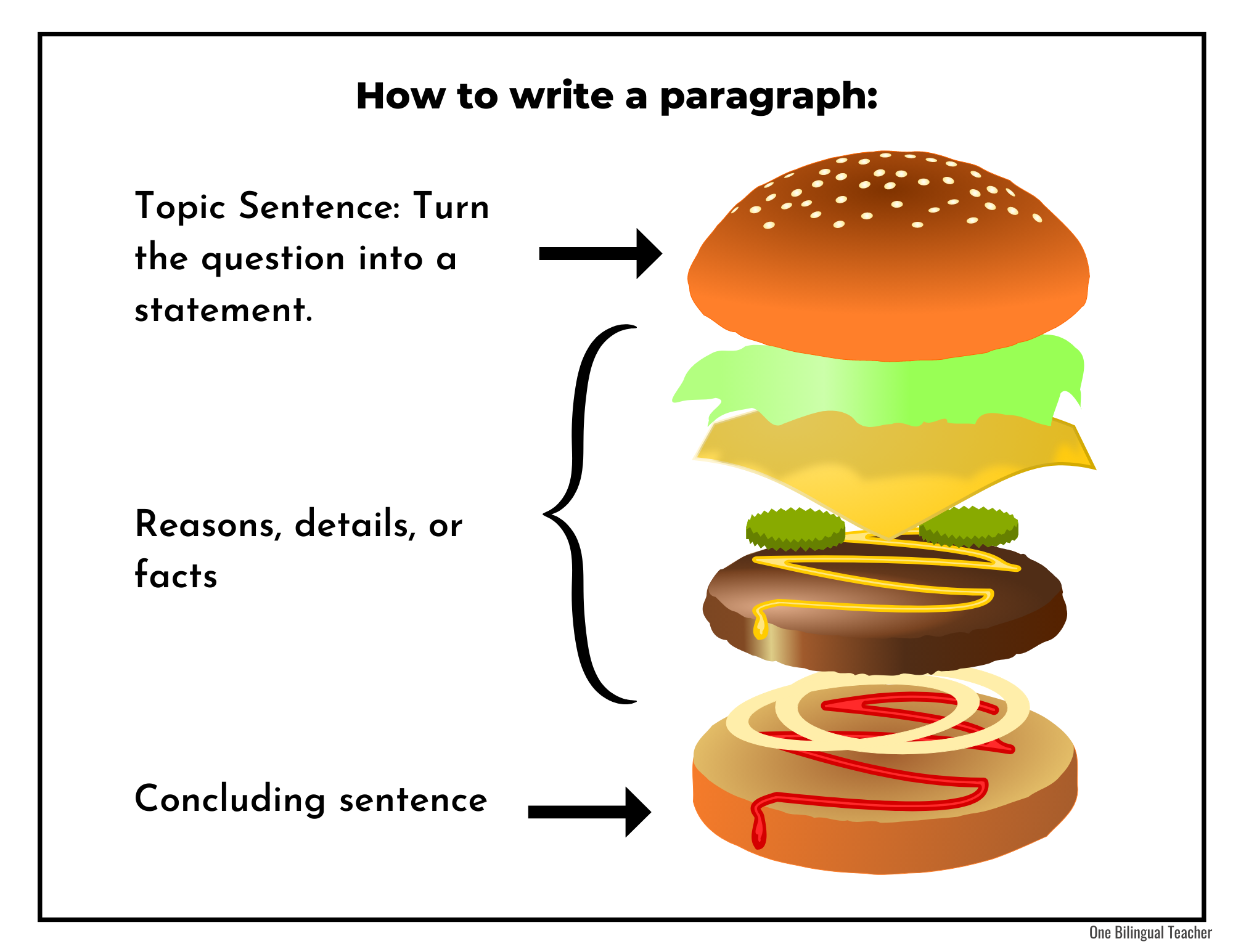
Pre-Writing Activities: Sparking Ideas and Organizing Thoughts
Now that we've got our students craving hamburgers, let's help them generate ideas for their paragraphs. Hold brainstorming sessions and let their creativity flow. Model using a mind map to get your students thinking. Do one for yourself first while you think out loud. Then think of a topic that you all have knowledge about. Maybe a recent field trip or another common experience. Use that topic for a mind map you’ll create together. This will help them organize their thoughts, giving them a roadmap to navigate their way through paragraph writing.

Constructing a Coherent Paragraph: Putting Words on Paper
Now it’s time to put those thoughts onto paper. Start by modeling how to write a clear and concise topic sentence. It's like the superhero of the paragraph—it sets the tone and grabs the reader's attention. Then, model how to provide supporting details that are relevant and compelling. They can be facts, examples, or even personal experiences.
And let's not forget about the importance of transition words—they're the glue that holds the whole paragraph together. Last, of course, model how to write a concluding sentence, one that wraps up the whole idea.
Revise, Revise, Revise: Polishing Paragraphs
Nobody's perfect on the first try, right? It’s so hard for students to understand that the first draft is never enough. It’s even harder for them to see all the revisions that we as teachers or their peers suggest. Either way, model the importance of going back and fine-tuning their paragraphs.
Encourage them to help you read your paragraph and ask themselves, "Does it make sense? Is it clear?" Introduce peer editing activities. Let your students become editors for each other. Once they get over the denial phase, collaboration and feedback can work wonders!
Do It All Over Again
Once you’ve modeled each step, it’s their turn to write their paragraphs. Go step by step. Depending on the level of your students, have them complete their own mind maps, or work with panthers. You can even brainstorm topics together.
If your students are ready, share exciting and engaging writing prompts to spark their imaginations. Ask them to write a paragraph about a superhero who saves the day with a unique superpower or describe their dream vacation destination. And don't forget to sprinkle in some multimedia resources like videos or images. Maybe you can watch a video together and then summarize it. The possibilities are endless!
Ideas for Narratives
Write about a time when you faced a challenge and how you overcame it.
Imagine you could have any superpower for a day. What would it be, and how would you use it?
Describe your dream vacation destination and why you would love to visit it.
Write a letter to your future self, sharing your goals and aspirations.
If you could invent a new toy, what would it be and how would it work?
Describe a person who has had a significant impact on your life and explain why they are important to you.
Write a short story about a mysterious object you find in your backyard.
If you could be any animal, which one would you choose and why?
Describe a place that you find peaceful and why it brings you comfort.
Write about a memorable adventure or trip you took with your family or friends.
In a Nutshell
With these tips and strategies, you're well-equipped to guide your students toward paragraph-writing greatness. Remember, adaptability is key—tweak these methods to suit the needs of your students. Embrace their diversity, create a supportive environment, and watch their writing skills soar.
Remember, with a little patience, encouragement, and a dash of creativity, your ESL students will become confident writers. You might just inspire the next great novelist or influential journalist. Happy teaching, and remember to celebrate each and every paragraph triumph along the way!
Need no-prep digital writing prompts? Download these for free!
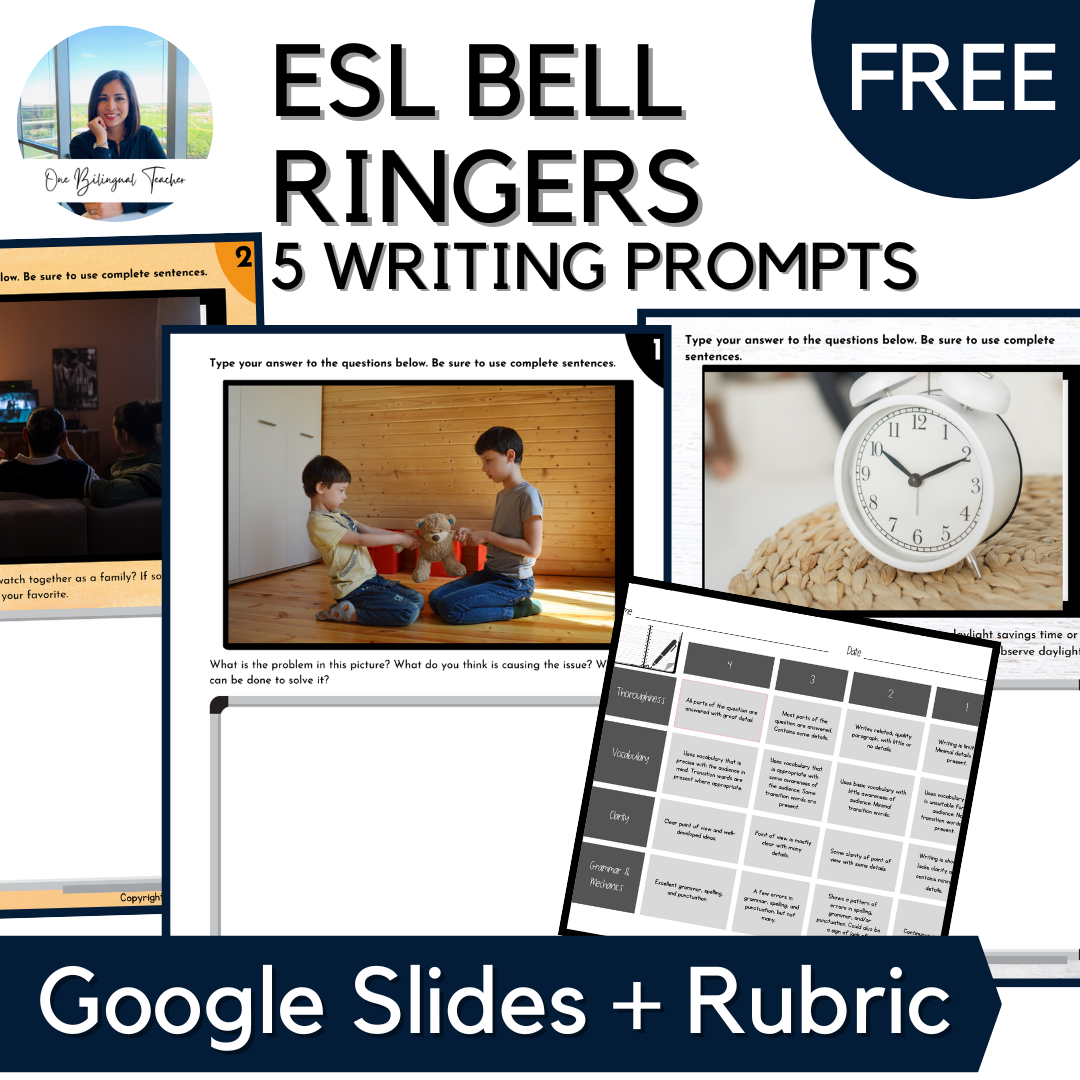
Teaching ESL students to Write Personal Narratives
Engaging listening activities for your esl classroom.
AI-Powered Essay Coach
Essaitech solutions limited, screenshots, description.
Essai: Your Path to English Essay Mastery Unlock your potential in English essay writing with Essai, the app designed to elevate your skills through personalized feedback for Grade 3 to Grade 9 students. Essai stands out with its unique combination of user-friendly design and advanced technology, making it a must-have tool for students, educators, and English language learners. How It Works Write & Submit: Write your essay on any topic and submit it through the app. Instant Analysis: Receive instant, AI-driven analysis of your work. Personalized Tips: Get actionable tips and suggestions to improve your writing style, structure, grammar, and more. Download Essai today and start your journey to becoming a more confident and skilled English essay writer!
Version 1.2
Experience the new Essai: Enhanced for a smoother, more intuitive user journey in essay writing feedback.
App Privacy
The developer, EssaiTech Solutions Limited , indicated that the app’s privacy practices may include handling of data as described below. For more information, see the developer’s privacy policy .
Data Used to Track You
The following data may be used to track you across apps and websites owned by other companies:
Data Linked to You
The following data may be collected and linked to your identity:
Data Not Linked to You
The following data may be collected but it is not linked to your identity:
- Contact Info
- User Content
Privacy practices may vary, for example, based on the features you use or your age. Learn More
Information
- App Support
- Privacy Policy
You Might Also Like
Waiter.com Driver
Document Scanner - Scan Photo
vCastSender
MAXHUB Share
GoShare Driver: Earn Money
Poe – Fast AI Chat

IMAGES
VIDEO
COMMENTS
Beginner Writing Lessons. The four units below are all taken from our book Write Right: 9 Beginner ESL Writing Lessons, available for instant download!. UNIT 1. Sample Essay: "My Hobby" - Introductory sample essay that students can reference later when writing their own essays
Remember that writing is more than a 5-paragraph essay. It's any time a student is writing something, even one word. With that in mind, you may want to try out this ESL writing game for beginners. ... One of my favourite, simple ESL writing activities is to get students to brainstorm words or things related to a certain topic or category. It ...
You can utilize an email writing activity to help your students build confidence and get more comfortable writing in English. Email can also teach your students things like proper language (formal or informal), structure and format. Email-related writing activities for ESL students can offer ample opportunities to teach all of these three aspects.
Download, edit and print all of the following worksheets for ESL teachers - completely free! Our worksheets archive is currently under development. Please get in touch if you want to contribute resources to share with your fellow teachers. Join our mailing list to receive a free ESL teaching resource every week.
The learning materials in this section are written and organised by level. There are different types of model texts, with writing tips and interactive exercises that practise the writing skills you need to do well at school, get good marks in your tests and exams, and get more out of your free-time activities.
maneli474. Guided essay writing task. The objective of the task is to guide the writing process through planning using thinking maps; editing and proofreading writing; using subject-verb agreement in... 773 uses. nghazi. argumentative essay writing practice. Assignment to help students write good thesis statement, explanation and then ...
To create an acrostic poem activity for your students, write a short series of letters such as BIRD on the board, one on top of the other. Each of the four letters is its own line of poetry like this: B. I. R. D. Create an example first for your students, such as: Barbara and. I went to the garden where.
Of course, essay writing can be challenging for ESL students. They must order their thoughts and construct their arguments—all in their second language. So, here are seven ESL essay writing tips that will allow your students to weave together a coherent and persuasive essay, plus teacher resources for writing activities, prompts and lessons!
This section offers writing practice to help you write clear, detailed text on a wide range of topics related to your interests. Texts include essays, reports, reviews, messages and emails. Each lesson has a preparation task, a model text with writing tips and three tasks to check your understanding and to practise a variety of writing skills.
The following activities can be used in the ESL classroom to help students better understand the essay writing process. Make changes as needed to best match students' English and writing ability ...
Introductory Academic Essay and Paragraph Writing Exercises and Worksheets. Basic or elementary academic writing classes usually focus on brainstorming, outlining, writing topic and support sentences and essay structure. A teacher might also teach the various forms of attention getters, some basic transitions and different kinds of essay ...
2 Brainstorm worksheet cluster diagram. This is a brainstorming and academic essay planning worksheet for students writing essays. The best way to get ideas for a paragraph or essay is to brainstorm with the aid of a graphic organizer. Students can freely associate ideas to a topic. This allows them to be more creative and explore any path ...
In these writing practice worksheets, students practice both reading and writing in these exercises. First, they read the uncompleted story. Then, they try to finish it using their own words. Beginning Finish the Story - The Snow Day. Beginning Finish the Story - The Fair. Beginning Finish the Story - Summer Camp.
(While they work for all kinds of students, we've found these topics are especially handy for teaching English to kids.) Writing practice should never be boring! When you're done this article, check out the 10 most engaging writing activities here. Descriptive ESL Writing Topics. Describe your favorite place in as much detail as possible ...
C1 writing. Are you a learner at C1 English level (advanced)? This section offers writing practice to help you write clear, well-structured texts about complex subjects. Texts include essays, proposals, articles, reports, reviews and emails. Each lesson has a preparation task, a model text with writing tips and three tasks to check your ...
Exercise 6 of the Reading and Writing paper of the IGCSE English as a Second Language (ESL) exam (0510/0511/0991/0993) is always a formal or semi-formal writing. It can be an article, an essay, a report, or a review. In this article, you will discover how to write an almost-perfect essay that impresses the examiner and gets you the highest band.
Structure The Essay. To help ESL students become better at writing in English, teach them a particular structure you would like them to follow when writing their essays. A typical writing structure with beginner ESL students would include an introduction, the main body of the text, and then a conclusion.
On this worksheet, students will learn how to write an opinion essay. This worksheet includes step by step the procedure when writing this type of texts. It also entails tw... 14333 uses. Arianey. How to write an opinion essay. Created for use with Interface 4, Unit 3.
What are some ESL writing activities and lesson plans for intermediate and advanced students? Facilitate a two-way journal experience with your students. ... Teaching writing to ESL/EFL students requires commitment and perhaps a bit of innovation on the part of the teacher, but if done well, it can prove immensely useful in a globalized world ...
Study diary. Look at the study diary and do the exercises to practise and improve your writing skills. 21. Are you an elementary (CEFR level A1) learner of English? Practise and improve your writing skills with these texts and exercises.
EAP Parts of an Essay Worksheet - Reading and Writing Exercises: True or False, Matching, Labelling, Brainstrorming, Creating an Essay Outline, Writing an Essay - Intermediate (B1-B2) - 90 minutes. In this free parts of an essay worksheet, students learn about the various parts that make up an academic essay and practice writing a structured ...
Pre-Writing Activities: Sparking Ideas and Organizing Thoughts. Now that we've got our students craving hamburgers, let's help them generate ideas for their paragraphs. Hold brainstorming sessions and let their creativity flow. Model using a mind map to get your students thinking. Do one for yourself first while you think out loud.
Give each student a copy of the four-page worksheet. Students begin by answering three true or false statements to review some basic essay structure knowledge. Exercise A - Answer key. False. True. False. True. Next, students match essay writing terms to their correct definitions. Exercise B - Answer key.
Unlock your potential in English essay writing with Essai, the app designed to elevate your skills through personalized feedback for Grade 3 to Grade 9 students. Essai stands out with its unique combination of user-friendly design and advanced technology, making it a must-have tool for students, educators, and English language learners. How It ...